2012




Letter from the President:
As we celebrate our 50th anniversary this year, it is an opportunity to look back at the college’s accomplishments and how far we have traveled. Since 1963, Rowan-Cabarrus Community College has educated over 600,000 individuals and has developed and delivered programs to meet the demands of our local community. Today, I am proud to say that Rowan-Cabarrus offers more than 50 degree, diploma and certification programs; seven fully online degree programs; many industry-recognized certifications; market-focused continuing education customized to meet specific educational and workforce needs; literacy education, and special personal interest classes. In 2012, we graduated our largest class ever. Annually, the college serves more than 20,000 individuals on our seven campuses and sites across our two counties.
In the next fifty years, we will be going into uncharted territory. Our nation’s economy is changing as is our job market. Our state and local unemployment rates remain high. Our definition of “normal” is being reset.
Through all of this uncertainty, I believe there is hope. Rowan-Cabarrus Community College is committed to the future of our region and its citizens. I believe that education is the compass to navigate forward. We all know that unemployment statistics aren’t equal – the less education you have, the more likely you are to be unemployed.
In Rowan and Cabarrus counties, the unemployment rate among workers with a bachelor’s degree or higher is only three percent. However, those individuals with just a high school diploma face a 16 percent unemployment rate. For those individuals without a high school diploma, the statistic is a staggering 21 percent.

I believe that Rowan-Cabarrus Community College will have an even more significant role in shaping the future of our community. Our region’s potential is too important to leave to chance. We must align strategic investments and resources to ensure that we influence and mold a future that provides hope and opportunity for our citizens.

Education is the best investment anyone can make. It improves the lives of individuals, their families and the community. Rowan-Cabarrus is dedicated to creating a future that offers hope and opportunity to all our citizens. We appreciate your support in this worthy effort.
Sincerely,

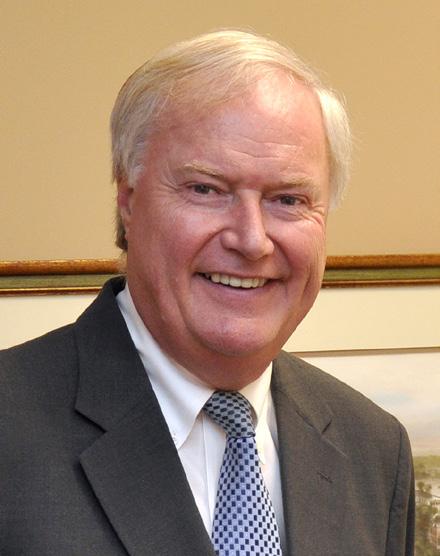
As the college celebrates 50 remarkable years of service, I feel compelled to thank our faculty and staff for their tireless efforts to improve our community. Despite continuous local and state funding challenges, Rowan-Cabarrus has made the most of its limited resources. The college remains committed to its mission of building sustainable futures through the power of learning.
Rowan-Cabarrus Community College has been a vital contributor to the economic health of both Rowan and Cabarrus counties for many years and has long been recognized for its important role in the education and retraining of our citizens. During the recent years of economic turmoil, Rowan-Cabarrus has been a prominent force in attracting and leveraging federal, state and local resources to improve programs and services for the community while ensuring that displaced workers and other citizens receive the training they need to succeed in the workplace.
Whether you are seeking a two-year degree or planning to transfer to a four-year institution, hoping to rejoin the workforce, or simply looking to improve your skills for new challenges or new careers, Rowan-Cabarrus will help you “Navigate Forward.” I believe that I speak for the entire Board of Trustees when I say that I am proud to have Rowan-Cabarrus at the helm, leading our community, as we navigate our collective future.
• The college has served over 600,000 students since its founding in 1963.
• Rowan-Cabarrus employs nearly 400 full-time faculty and staff members as well as 600 part-time faculty and staff.
• Approximately 61 percent of Rowan-Cabarrus students are enrolled in Corporate and Continuing Education classes.
• Sixty-three percent of our students are female, 37 percent are male, 67 percent are under 30 and 41 percent are minorities.
• Nearly half of our students work full or part-time.
• Rowan-Cabarrus graduated its largest class ever with 1,006 graduates in 2012.
• Among the 1,006 graduates were our first early college graduates: in four short years, 38 early college students completed their high school diplomas and associate degrees.
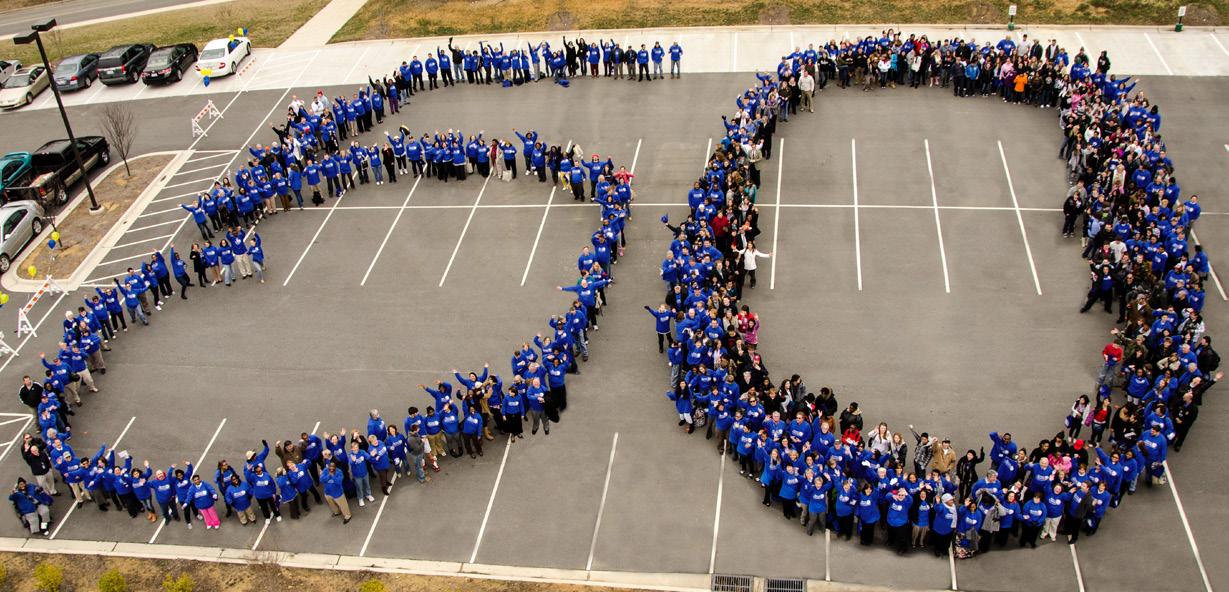
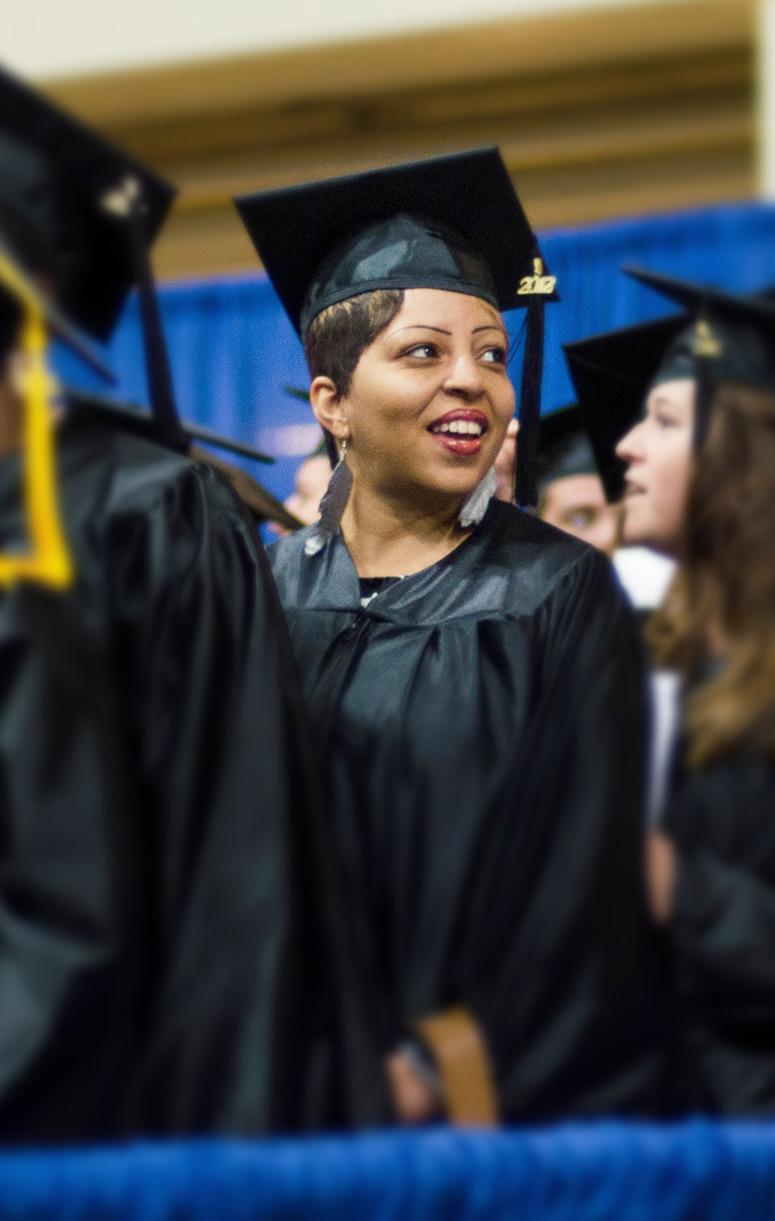
“Simply, more education pays off in higher earnings. But it also provides some security against unemployment.”
– Carl M. Short, chair of the college’s Board of Trustees
Spring 2012 represented the largest graduating class to-date for RowanCabarrus Community College.
In May 2012, 1,006 students graduated. The students ranged in age from 17 to 70, with the average age being 32. An additional 411 students graduated from the college’s GED (high school equivalency) program.
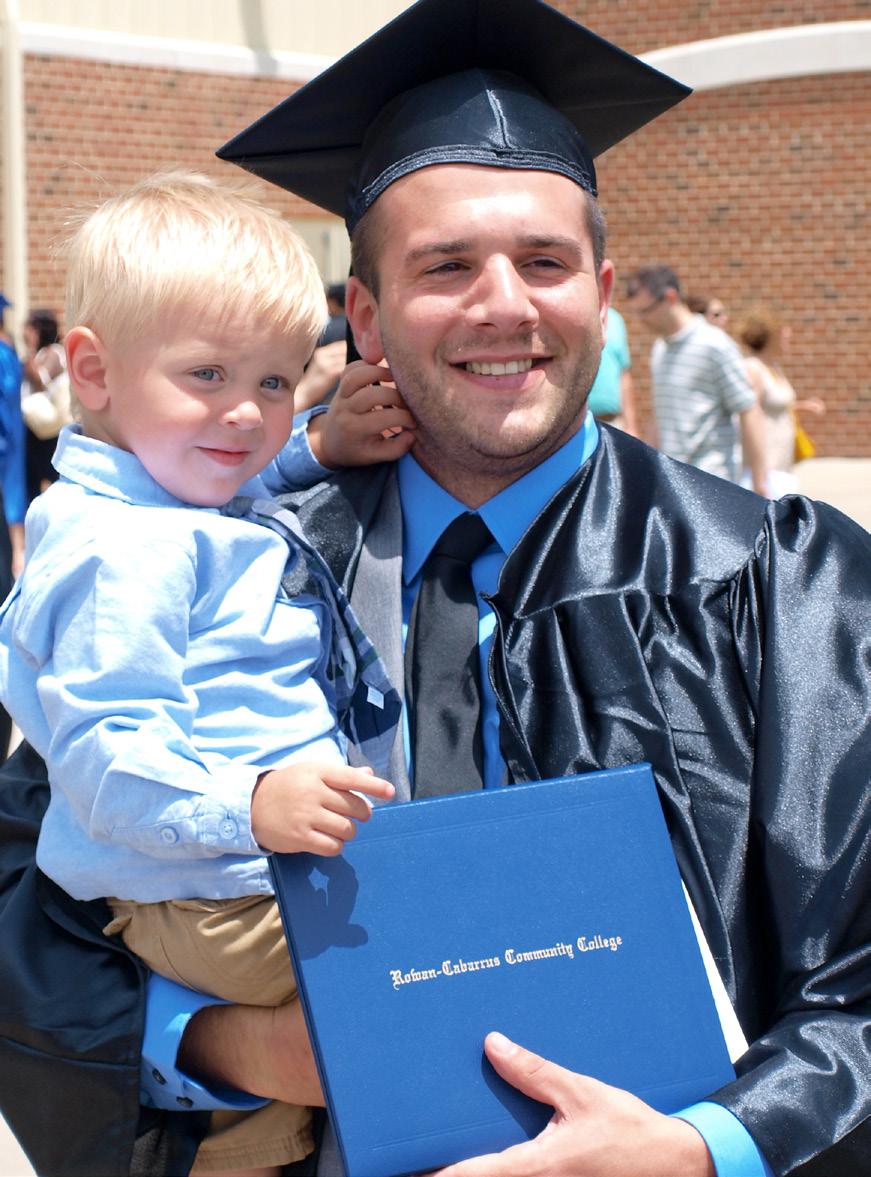
Among the graduates were 38 early college students who had graduated the night before with their high school diplomas and the next day left the Rowan-Cabarrus graduation with their associate degrees. This class of students from Rowan County Early College is the first of the two Rowan-Cabarrus early college programs to graduate.
“Graduates, I encourage you to commit yourself to a lifetime of learning and to dream big,” Dr. Carol S. Spalding, RowanCabarrus president, said. “I encourage you to spend your valuable time with people who will encourage you to achieve your dreams, not settle for less.”
During her remarks as commencement speaker, Phyllis Wingate, president of Carolinas Medical Center-NorthEast (CMCNorthEast), encouraged students to look to the future with will and determination.
“You are entering the workforce at a very challenging time,” Wingate said. “It is a time that is filled with opportunity if you have the will to take advantage of it.”
Rowan-Cabarrus continues to focus on identifying and creating pathways for students to sustainable careers through new program development, enhanced academic advising, and articulations with other educational partners.
“While the economy isn’t in the best shape right now, we are confident that those who have taken the time to improve their skills and earn a certificate, diploma or degree will be first in line for those jobs when things turn around,” said President Spalding.
Additionally, a review of tuition and fees for surrounding colleges shows that RowanCabarrus is less than half as expensive as the lowest cost college (University of North Carolina at Charlotte – $5,873 per semester).
“More education pays off in higher earnings, in addition to providing some security against unemployment,” said Carl M. Short, chair of the college’s Board of Trustees.
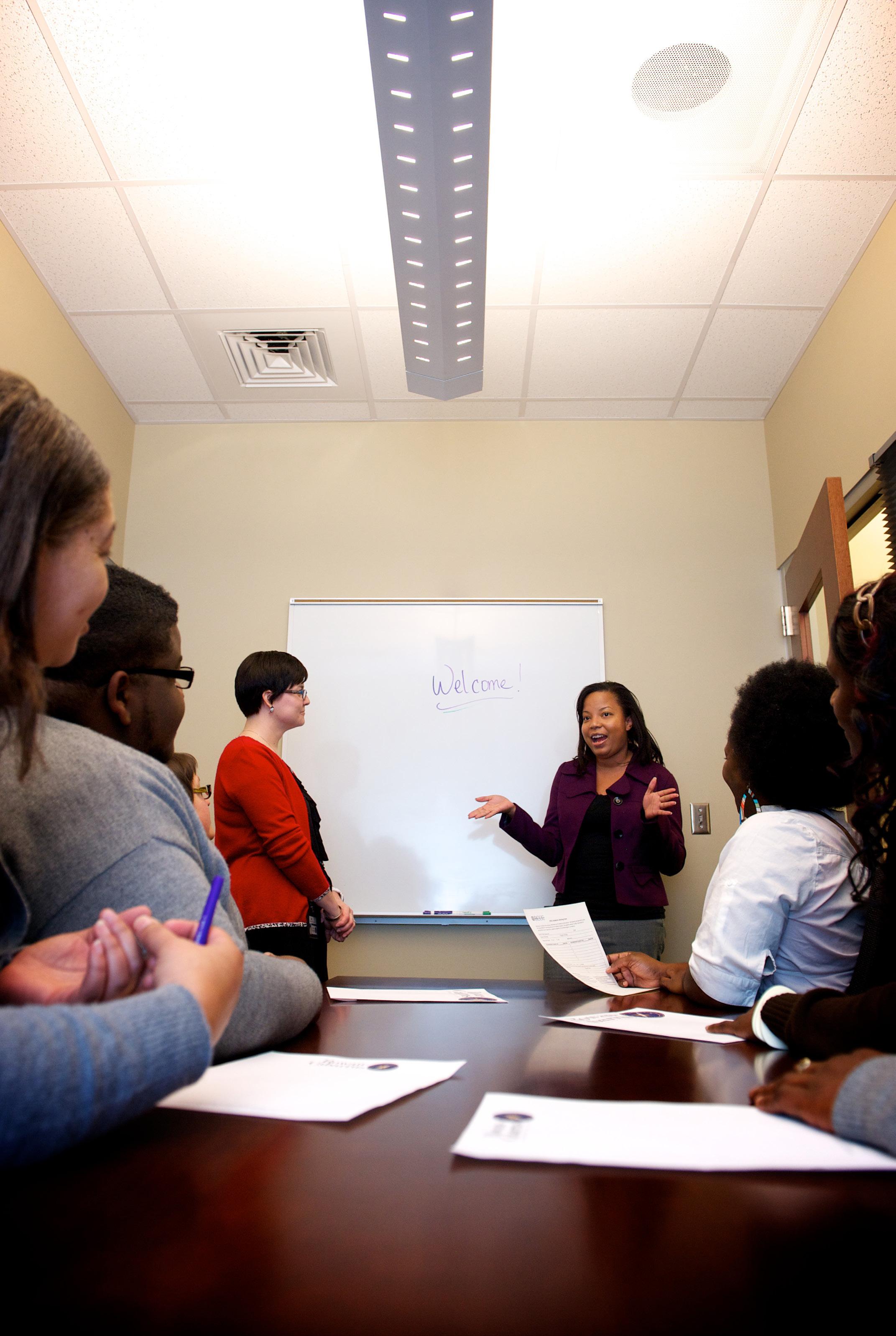
“You can’t improve what is already great.”
– Damion Boomer, student
In September 2011, Rowan-Cabarrus Community College was awarded $1.8 million from the U.S. Department of Education as part of the Strengthening Institutions Program (SIP) grants. Only one of two colleges in North Carolina to receive this Title III funding, Rowan-Cabarrus hopes to ultimately improve student persistence, retention and graduation rates.
Rowan-Cabarrus has used the grant to establish Academic and Career Advising (ACA) Centers on both the North Campus in Rowan County and the South Campus in Cabarrus County.
With program services initiated in summer 2012, Academic and Career Advising Center activities are already well underway.
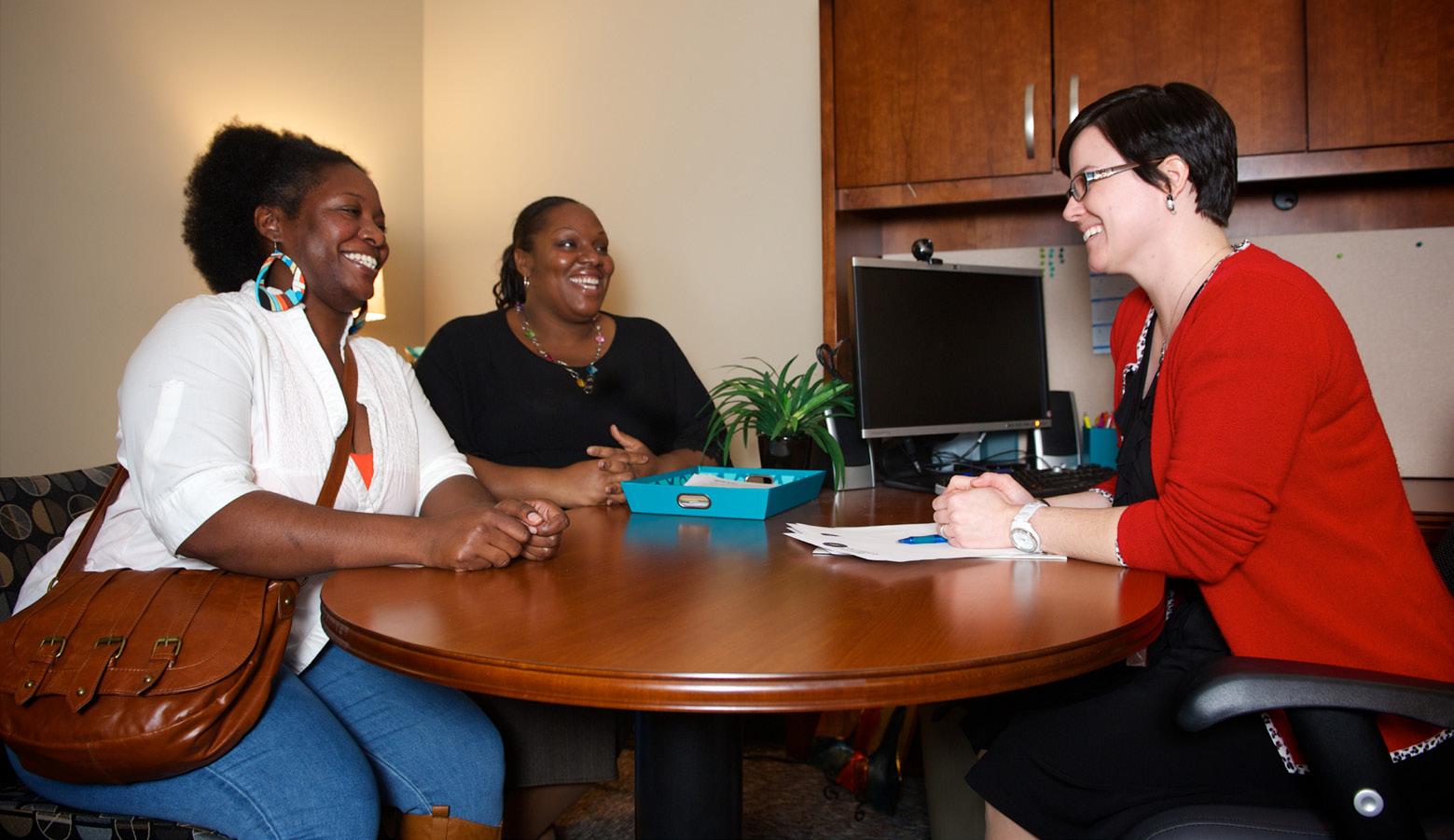
“Students feel positively about the various programmatic offerings, indicating that they are helpful and that they would refer their friends to the center,” said President Spalding. “In fact, 99 percent of the students that have visited the ACA Center would refer it to a friend or another student.”

The ACA Centers opened to students on June 1, 2012. In the initial phase of the project, center staff hoped to serve 10 percent of the student population, or just over 600 students. Instead, nearly 1,500 individual students accessed the services provided!
All enrolled students have access to the services provided under the grant, though services will initially be focused primarily on undecided students and developmental students, with further expansion to transfer students in subsequent years of the project.
The college’s commitment to this effort is part of a unified effort by community colleges across the country to increase the rate of college graduation.
“Rowan-Cabarrus is committed to the ‘Completion Agenda’ and securing this grant is part of the college’s work toward achieving the national goal for America to lead the world in college graduates by 2020,” said President Spalding.
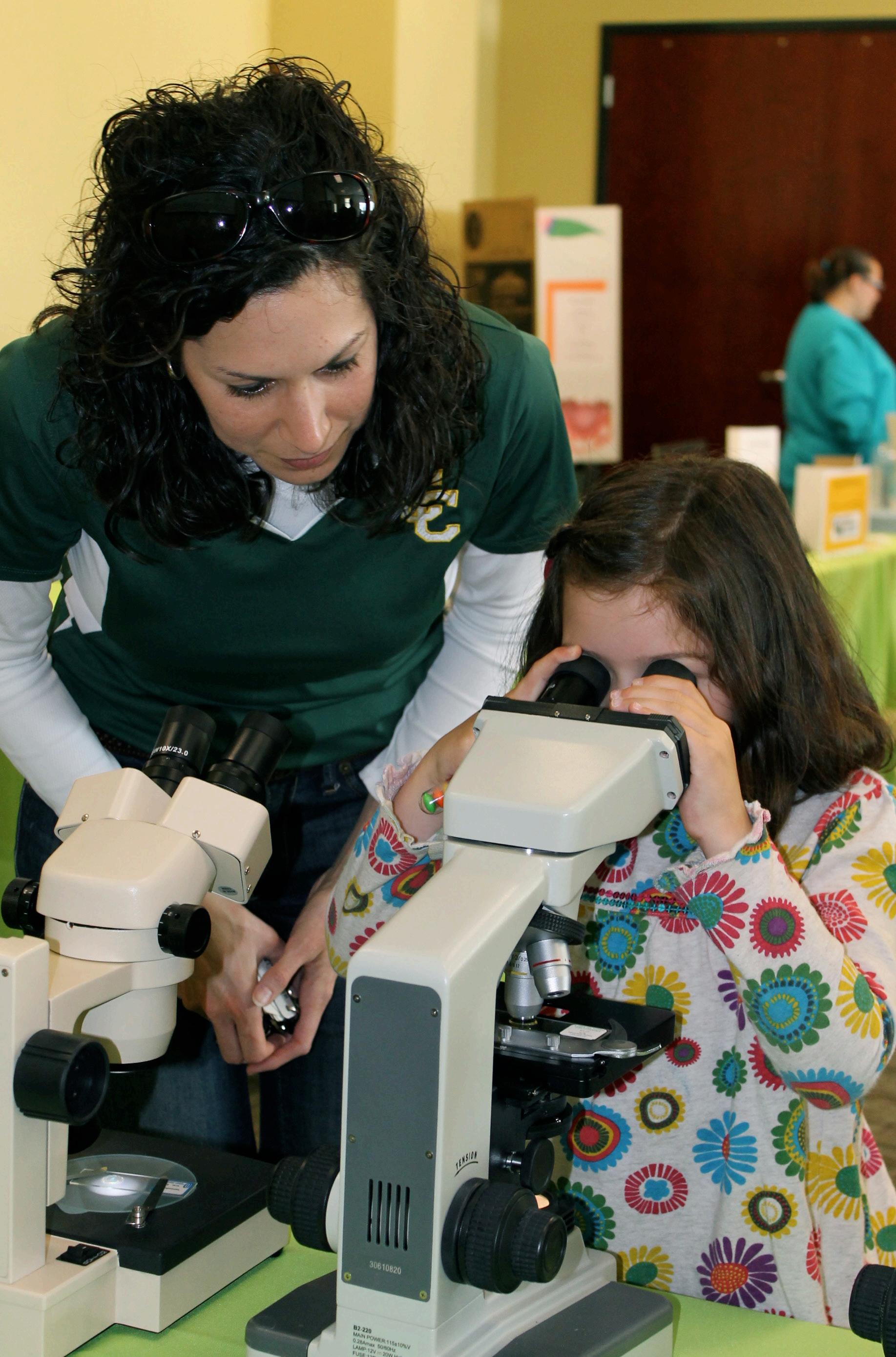
“Almost everything we do in life has STEM applications, but not everyone realizes it.”
– Dr. Marcy Corjay, dean of the college’s science, biotechnology, mathematics and information technology programs
Rowan-Cabarrus Community College hosted its first annual STEM Open House on its North Carolina Research Campus (NCRC) facility in April 2012.

“The STEM Open House was a true celebration of STEM – Science, Technology, Engineering and Mathematics,” said President Spalding. “I fully believe that everyone can be interested in STEM and it’s critical we embrace these subjects. America used to be the leader in technology and innovation. We are working to reclaim that role.”
Between 400 and 500 members of the community visited the college’s STEM Open House. The college provided dozens of fun, interactive exhibits for kids and adults of all ages to dazzle the senses and stir curiosity for all things STEM. Attendees were able to perform DNA extraction in the college’s science labs, engage in activities involving video games and even learn how STEM plays a role in fighting fires.
“Almost everything we do in life has STEM applications, but not everyone realizes it,” said Dr. Marcy Corjay, dean of the college’s science, biotechnology, mathematics and information technology programs. “STEM subjects are very concrete. Science deals with our natural and physical world. Technology has given us the iPads, smart phones and computers we use every single day. Engineering is all about building things. Mathematics ranges from financial decisions to gaming strategies, such as playing pool or engaging in games of logic.”
The exhibits were extremely diverse –everything from the complexity of balancing pH in dyeing hair and the chemistry of making ice cream, to engineering principles used in developing videogames and high performance race car technology.
The target audience for the open house was broader than traditional open houses hosted by the college. In addition to recruiting more
traditional-aged prospective students, the college aspired to host younger children with their parents. Locals K-12 schools, homeschool students and their families were in attendance.
The day following the STEM Open House event, President Spalding was invited to Raleigh to speak about the college’s STEM programs at the North Carolina Museum of Natural Sciences’ grand opening event of the Nature Research Center. Among renowned scientists and guests such as Jane Goodall, President Spalding spoke to the 50,000+ attendees of the Nature Research Center’s “24 hours of Science” kickoff event.
President Spalding was invited to address the college’s role on the North Carolina Research Campus and the college’s commitment to retraining dislocated workers, specifically with respect to the biotechnology program.
“Among the victories of the biotechnology program, the most exciting to me is that we’ve taken a highly quantitative program and successfully trained students who never thought they were good at science,” said President Spalding.
“Traditionally in North Carolina, only 50 percent of students who come to college in what we call developmental or remedial math classes actually complete the program,” said Dr. Rod M. Townley, vice president of academic programs. “In our inaugural biotechnology graduating class in 2011, 71 percent of the biotechnology graduates began in developmental math! To have developmental math students demonstrate this level of success is rare and something we’re extremely proud of.”
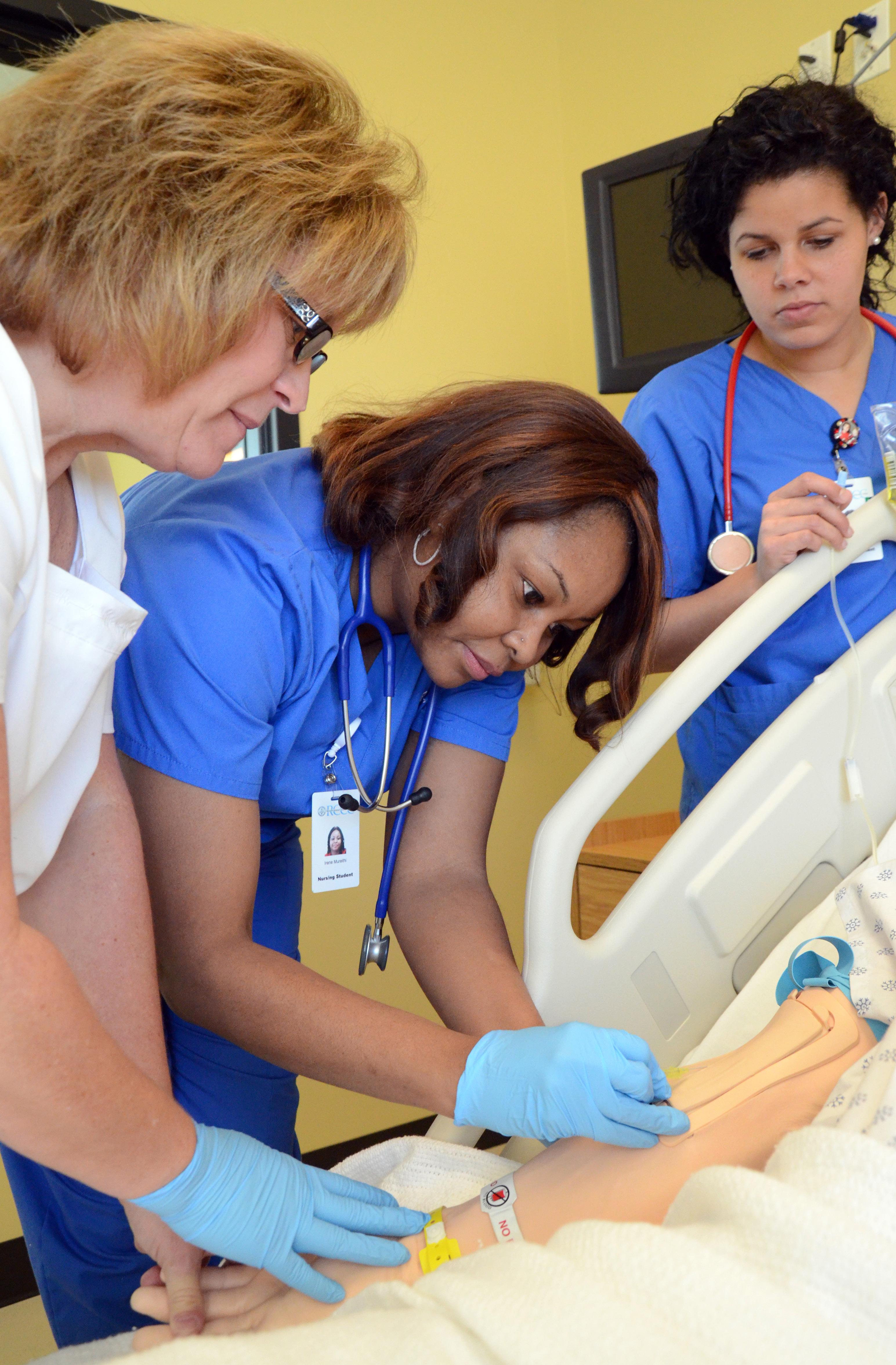
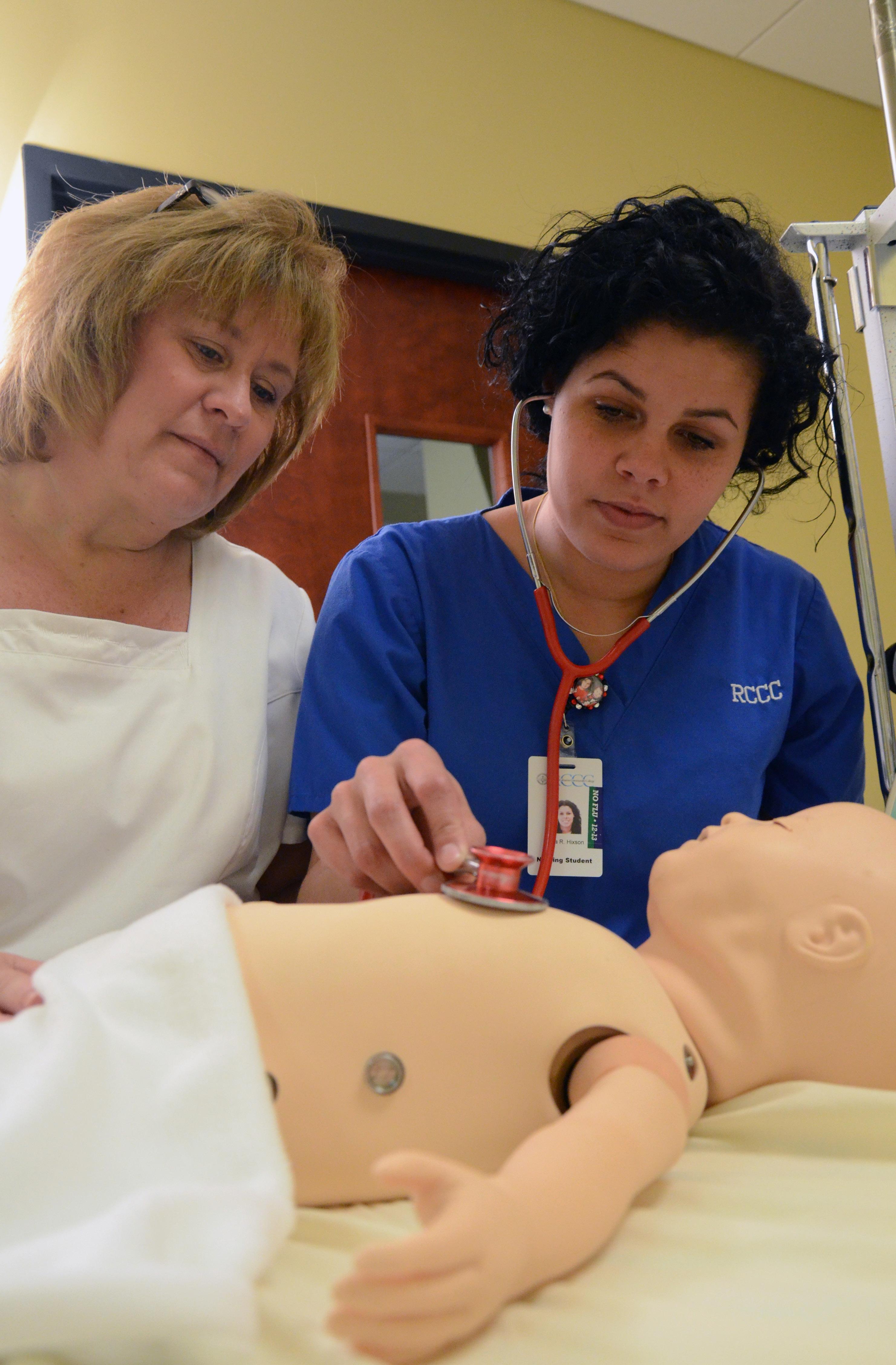
“We need more jobs in Rowan County, and having a ready workforce through the community college is a key element of that.”
– Darise D. Caldwell, president of Rowan Regional Medical Center
2012 marked an exciting opportunity to reunite the college’s licensed practical nursing and registered nursing programs under the same roof at the college’s North Carolina Research Campus (NCRC) facility.
The Rowan-Cabarrus nursing programs now occupy a full half-floor in the building, including a simulation lab where students practice skills by working with lifelike mannequins. The transition also frees up space at Rowan-Cabarrus North and South Campuses, where the programs had previously resided.
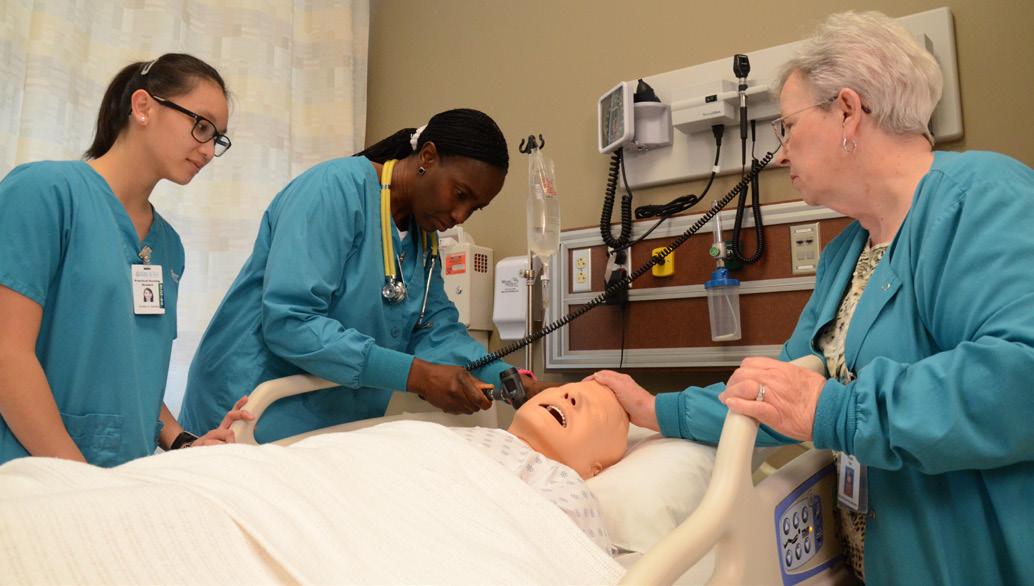

“Shifting the programs to NCRC is a logical solution, because we believe nursing will help translate biotechnology into something people understand,” said President Spalding. “Uniting the programs allows us to share resources such as equipment and faculty. The new location also offers the potential for our students to interact with scientists on the North Carolina Research Campus.”
In addition to the move, the nursing program documented an incredibly successful year related to both student performance and program recognition. Rowan-Cabarrus offers multiple nursing program options, including associate degree in nursing (ADN), licensed practical nursing (LPN) and the LPN to ADN transition. The college was proud to announce that its associate degree nursing program achieved a 100 percent passing rate when the entire class of students passed their National Council Licensure Exam (NCLEX).
“We work extremely hard with our students to ensure that they are able to pass this exam, but it is remarkable to have all of them pass and become registered nurses,” said Cathy Norris, RN, MSN, director of the program. “It is an honor to be only one of four community colleges in the state of North Carolina to have earned this distinction.”
Rowan-Cabarrus is also one of only eight programs in the state – among private colleges, universities, and other community colleges alike – to be recognized with this achievement.
“Rowan-Cabarrus students pass the state and national board exams well above state and national averages,” said Dr. Rod M. Townley, vice president of academic programs. “Our graduates serve as nurses at Rowan Regional Medical Center, the Veteran’s Administration Medical Center, Carolina’s Medical CenterNortheast, long-term care facilities, hospice and other organizations in North Carolina. We are very proud.”
The college also received accreditation from the prestigious National League for Nursing Accrediting Commission, Inc. for its nursing programs. The college received this nationally recognized accreditation for both its ADN and LPN programs. The ADN program is one of only 14 programs among the 58 community colleges in North Carolina that is nationally accredited, while the LPN program is the second program across the entire state – out of 48 other programs – to receive this accreditation.
“We are extremely proud of the nursing program’s excellence and the service our nurses provide to our community,” said Carl M. Short, chair of the Rowan-Cabarrus Board of Trustees. “We are also thrilled that they now have state of the art facilities in their new space at NCRC.”
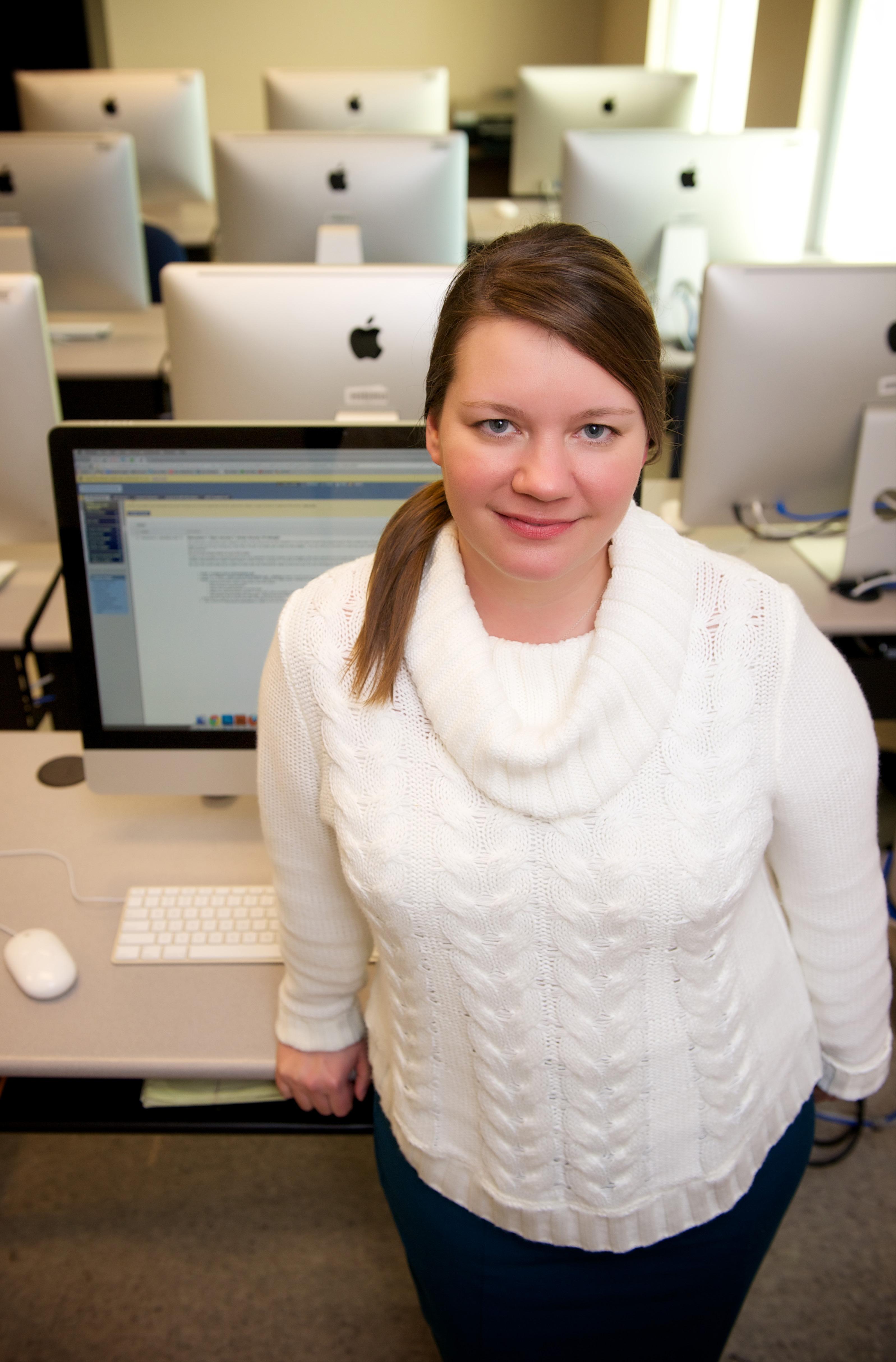
“We know our students are incredibly busy – with jobs, families and community commitments – that’s why it’s important to us to provide convenient programming to accommodate their busy lifestyles.”
– Dr. Rod M. Townley, vice president of academic programs
Online learning, or distance education, is designed to allow students to participate in learning outside of the traditional classroom. The college’s goal is to provide students greater flexibility in scheduling classes while affording RowanCabarrus faculty with new and innovative approaches to teaching.
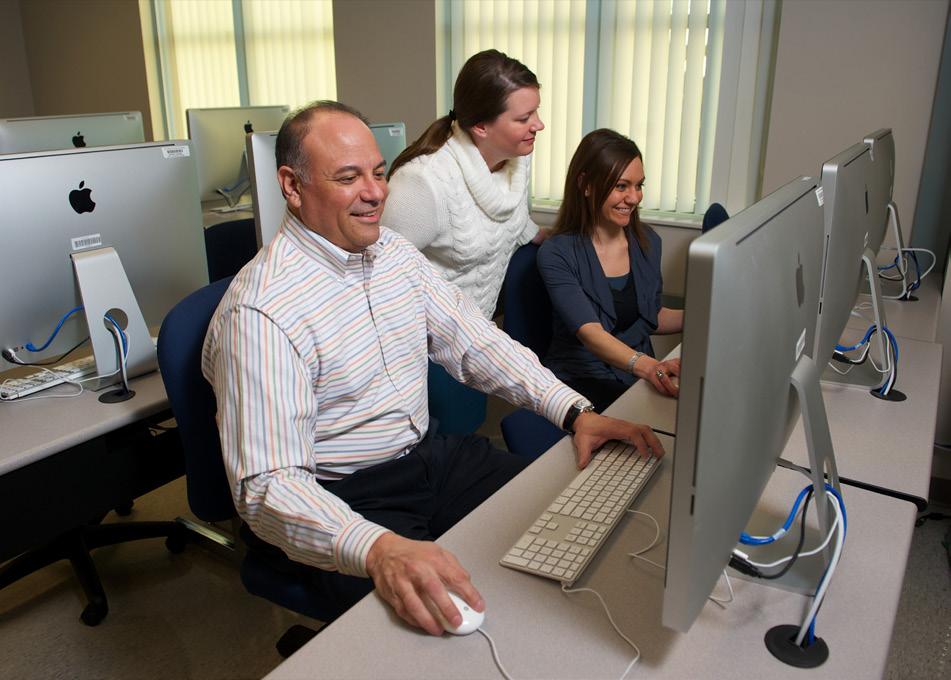
One instructor at Rowan-Cabarrus has taken online education to a new level. Karen Lynden’s commitment to her online classes was evident when she received not just one, but two separate national awards for her “Leadership and Management Skills” class. Both Blackboard and the Instructional Technology Council (ITC) recognized Lynden’s class for excellence.
“Having my course recognized is a true honor,” said Lynden, business administration instructor at Rowan-Cabarrus. “The feedback helps me continuously develop my online teaching strategies.”
Lynden’s online class incorporated a variety of learning approaches and used online technologies to create a dynamic, interactive environment that fully engaged students. Her high ADA (Americans with Disabilities Act) compliance standards, use of service learning and efforts to create a student community stood out among the competition. One of the judges noted that despite recognition for this course in 2011, “The instructor did not rest on her laurels; instead, she kept moving forward to make the course unique. The course is a work in progress, not frozen in time.”
“The design of the selected course was built on the foundation of a prototype instructional design template that was in process for our college’s Internet and Hybrid offerings,” said Lynden. “Receiving this recognition validates that our overall institution’s online course templates have a solid foundation!”
“Rowan-Cabarrus Community College is committed to excellence for our teachers and our students,” said President Spalding. “We are extremely proud of Karen and her fabulous work as an instructor.”
The college now offers seven degrees completely online: Associate in Arts (AA), AA in History, AA in Political Science, Associate in Applied Science (AAS) in Accounting, AAS in Business Administration, AAS in Business Administration-Marketing and Retailing and AAS in Criminal Justice; seven additional degrees have 90 percent or more of courses available online. Additionally, three diplomas can be completed entirely online – two within Business Administration and one within Accounting, along with 15 certificates – eight within Business Administration and seven within Accounting.
“Obviously, some degrees are not conducive to becoming entirely online. Where it is possible, however, we are seeking to provide these opportunities,” said Debra NeeSmith, dean of educational resource services.
“I am so proud of Ken! As a graduate of Rowan-Cabarrus Community College and an instructor here for 22 years, we are truly lucky to call him one of our own.”
– Dr. Carol S. Spalding, president of Rowan-Cabarrus
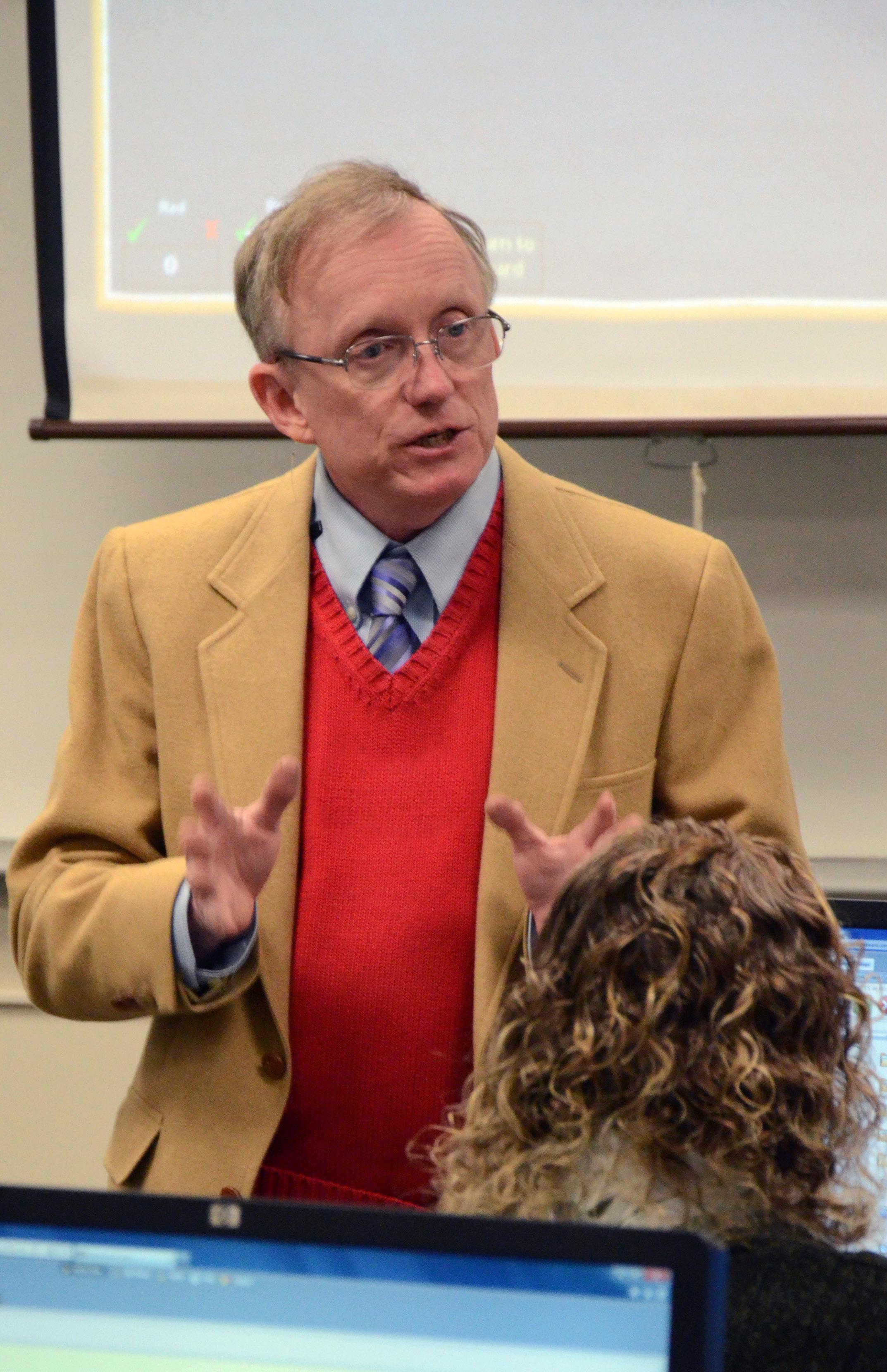
Every year, Rowan-Cabarrus Community College recognizes its most excellent teachers. In 2012, the college was honored to have its 2011-2012 Outstanding Excellence in Teaching award recipient, Paul Ken Clifton, selected as one of five finalists among the 58 North Carolina community colleges.
Clifton, instructor for Computer Information Technology, became the college’s nominee for the 2012 North Carolina Community College System’s R.J. Reynolds Excellence in Teaching Award.
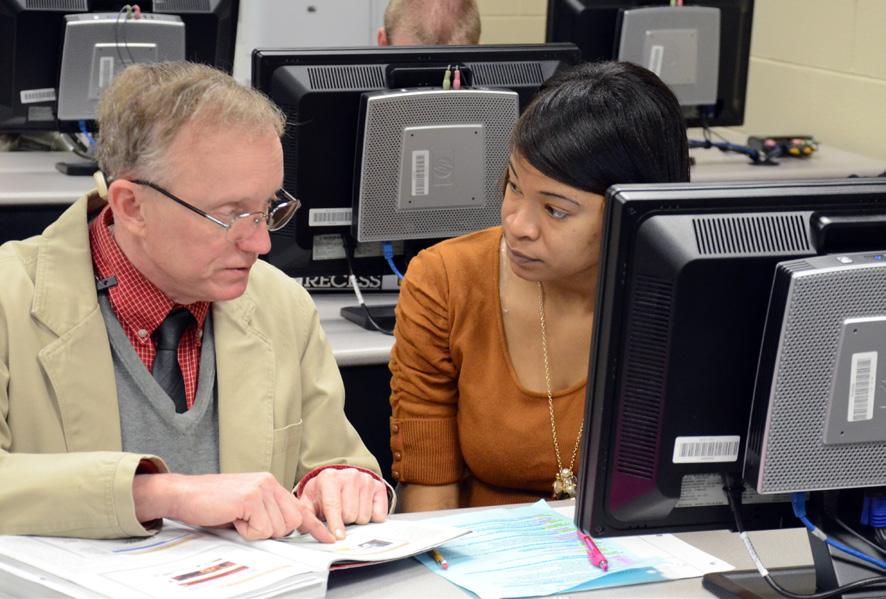

“I am so proud of Ken! As a graduate of Rowan-Cabarrus Community College and an instructor here for 22 years, we are truly lucky to call him one of our own,” said President Spalding.
“Rowan-Cabarrus Community College has changed my life, and I’m all about giving back. I feel like I’m a beneficiary of the college in a lot of ways,” said Clifton. “More than anything, I enjoy working with all of the different students and programs. Because the introduction to computers class is required for most students, I get to see many students who come through our doors.”
Clifton is also well-known for his personal and professional commitment to “go green.” What started as simply wanting to leave a better world for his children turned into a passion, including additional teaching and hands-on work with companies like Duke Energy and Frierich Foods.
Ken holds a bachelor’s degree from Catawba College and a master’s degree in electronic commerce from the University of Maryland. Clifton and his wife, Katherine, reside in Salisbury.
“People at Rowan-Cabarrus work really hard. Having been a student here myself, I really try to think about what they’re dealing with in their lives. I hope that makes me a better teacher,” said Clifton.
“All of these faculty members, and many others, do a wonderful job of providing topquality instruction to the students at RowanCabarrus,” said Dr. Rod M. Townley, vice president of academic programs.
Three faculty members received Excellence in Teaching Awards with special distinction. They are:
• Ginger Sigmon Fox, English (Support to the Mission of the College Recognition)
• Melissa Reid, mathematics (Use of Technology in Instruction Recognition)
• Lara Swenson, chemistry (Active Learning Practices Recognition)
The remaining Excellence in Teaching Award winners are:
• Dr. Shirley Foley, biotechnology
• Roberta A. Kern, foreign language, Spanish
• Frank Merrell, industrial engineering technology
• Maria Rodriguez, foreign language, Spanish
• Joslyn E. Blackburn, business/marketing (adjunct instructor)
“We are proud of this group of instructors for the commitment they have made to our community and our students,” said President Spalding. “Rowan-Cabarrus Community College has a long and proud tradition of hiring highly qualified and dedicated faculty in all of its academic programs.”
“Through one-on-one counseling I was able to clarify my target market and business direction.”
– Daniel Smith, owner, Smith Environmental Solutions, Inc.
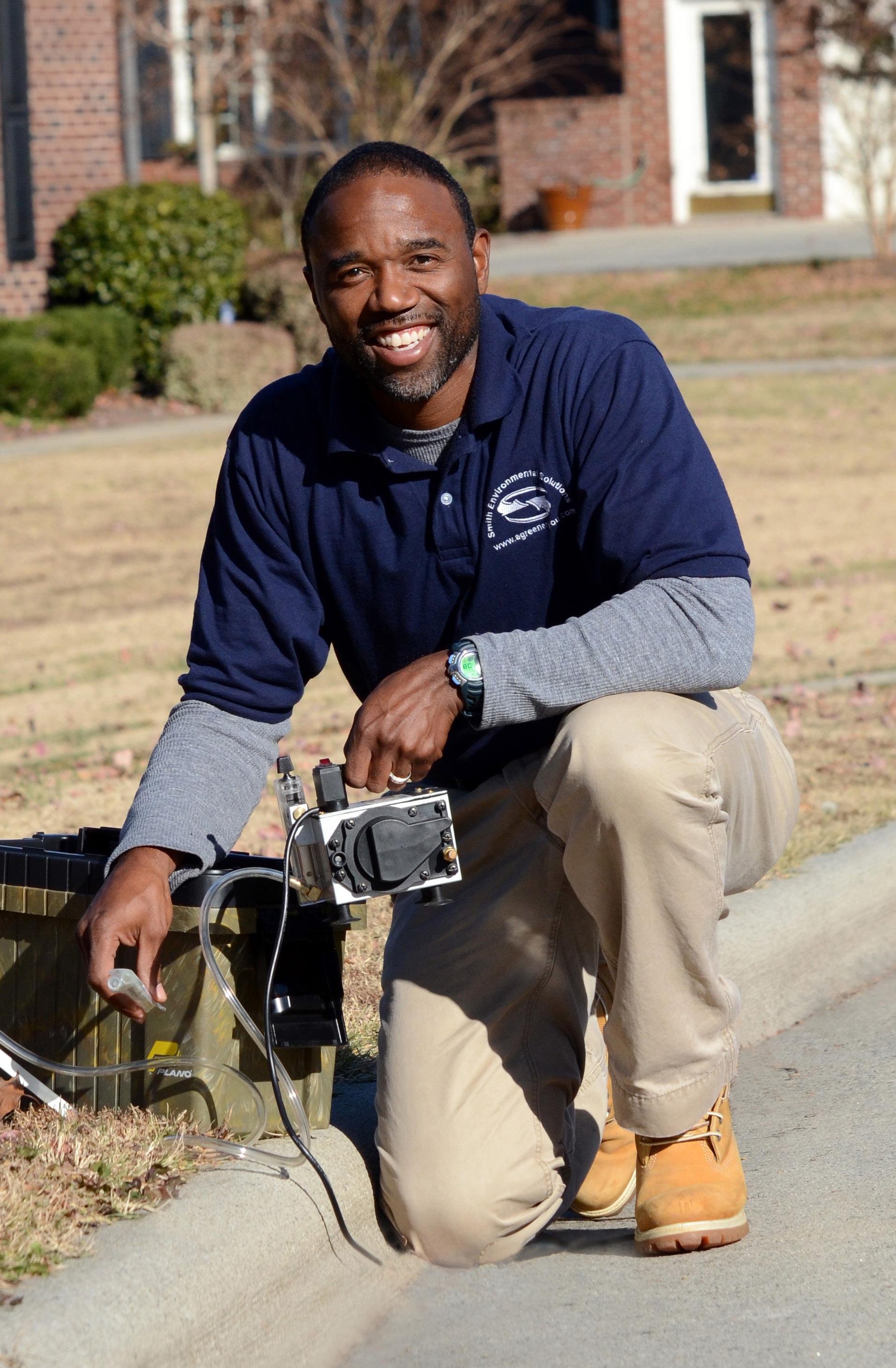
Rowan-Cabarrus Community College was honored to be among six Small Business Centers in the state to receive regional excellence awards during the North Carolina Business Advisors’ Conference in Wilmington, N.C., in November. RowanCabarrus was recognized as the Charlotte region’s Center of Excellence.
“The Small Business Center at RowanCabarrus Community College is at the heart of small business resources in Concord, Kannapolis, Salisbury and surrounding towns,” said Carl M. Short, chair of the college’s Board of Trustees. “Whether you want to start a small business or grow an existing business, the Small Business Center can help you develop a plan of action for lasting success.”
The Small Business Center’s goal is simple – to provide high quality small business education and relevant, comprehensive assistance to local small businesses.
“Small businesses are a vital part of North Carolina’s economic growth,” said NC Community College System President, Dr. Scott Ralls. “Businesses launched through the support of our centers have met community needs, secured military contracts and provided countless employment opportunities to the residents of the communities they serve. From drafting their business plan, to opening day and beyond, the staff members of our Small Business Centers are helping potential entrepreneurs find success as business owners.”
The Rowan-Cabarrus Small Business Center is a community-based provider of education, training, counseling, information and referral, assisting entrepreneurs with business ideas and existing small business ventures.


The Small Business Center also offers free seminars with added support from the Rowan County Chamber of Commerce, Cabarrus Regional Chamber of Commerce, the City of Kannapolis, the Rowan Business Alliance, RowanWorks Economic Development, the Small Business & Technology Development Center and Downtown Salisbury, Inc.
“The seminars cover a broad range of small business topics, including business startups, business financing, marketing, internet business, business growth and development, taxes, recordkeeping and customer service,” said Barbara Hall, director of the college’s Small Business Center.
Small Business Centers are located at all 58 N.C. community colleges. The Small Business Center Network (SBCN) is organized in six regions to correspond with the system’s customized training regions and increase coordination with the regional economic development partnerships. In 2010-2011, SBCN provided 3,683 seminars to 53,458 attendees and counseling to 6,817 individuals, resulting in 742 business startups and 3,372 jobs created or retained.
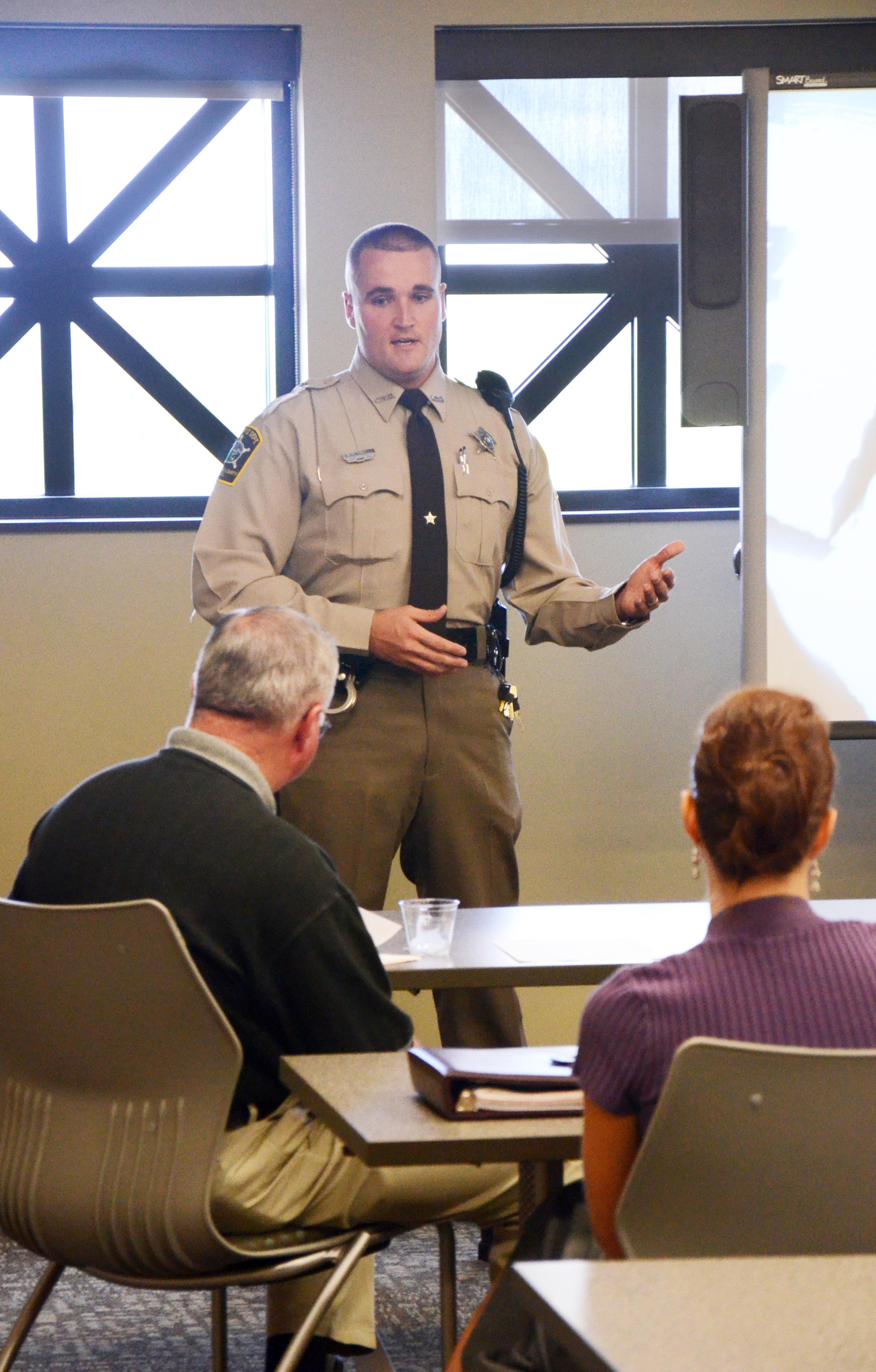
“Hard work and dedication are key to success, and I learned that very clearly as part of the Rowan-Cabarrus Basic Law Enforcement Training program.”
– Deputy Kevin Klinglesmith, alumnus
New” was the theme of 2012 for the college’s criminal justice programs. The program experienced everything from a new state-of-the-art facility at the Cabarrus County Sheriff’s Administration building to new program development for online and oncampus learning.
Rowan-Cabarrus Community College was pleased to partner with Cabarrus County government to relocate its Cabarrus County law enforcement training to the new Sheriff’s Administration building in downtown Concord.
“The training presented in this new facility is extremely important. I’m grateful to the county for providing this new modern training space,” said President Spalding. “The move to the sheriff’s building makes a lot of sense, as many of our students aspire to work there someday.”
The college’s Basic Law Enforcement Training (BLET) program trains local leaders and develops officers who protect our citizens in our community every day.
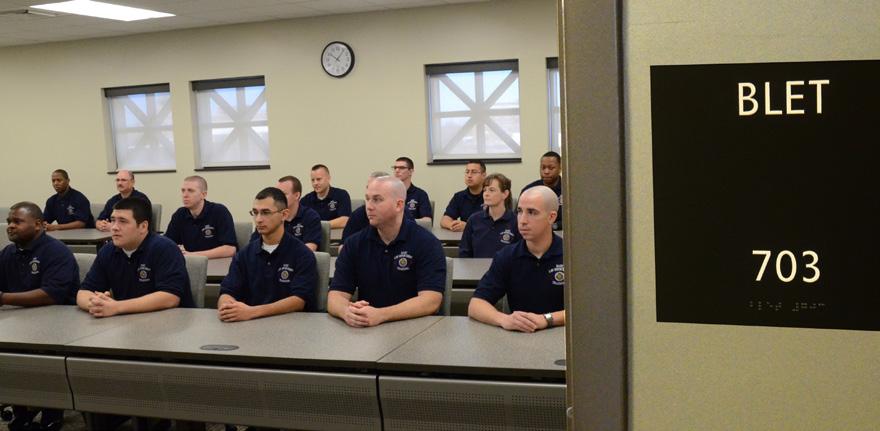

“This new space is vital to the delivery of the college’s programs in Cabarrus County,” said Spencer J. Rummage, Jr., director of the college’s BLET Program and dean of public services. “I have been involved with the delivery of law enforcement training courses for almost twenty-three years now, and this is, without a doubt, the nicest facility I have ever been given the privilege to use. The design, materials, classroom technology and even the furniture are all state-of-the-art. We are all so thankful and excited about this new facility.”
The college was also pleased to begin offering its criminal justice program entirely online. The Associate in Applied Science (AAS) in Criminal Justice can be completed entirely in the classroom, entirely online, or through a combination of online and classroom-based courses.
“The criminal justice program gives students the flexibility of online courses while guaranteeing that they will always have help
from qualified faculty,” said Kimberly Boling, coordinator of the online criminal justice program. “The program’s set-up means that students can connect with professors and fellow students on their own time.”
“We know our students lead demanding lives – with jobs, families and community commitments – that’s why it’s important to us to provide important job preparation courses online to accommodate their busy lifestyles,” said President Spalding.
The college also has developed plans to bring an Emergency Management program to the college next year, pending state approval.
“Being prepared for emergency situations is becoming exceedingly more important in our world. It’s critical to be ready for both natural disasters and manmade situations that are evolving faster than technology,” said Boling, who is also program developer of the Emergency Management program.
The Emergency Management program will be designed for individuals who are seeking careers that are related to management of emergency and catastrophic situations. Tornadoes, floods, earthquakes, hurricanes, hazardous chemical spills and acts of terrorism are all examples of public emergencies in which lives and property are threatened. This degree will prepare students for a position in public and private sector agencies as well as organizations like FEMA (Federal Emergency Management Agency) that work to minimize the effects of disasters on the public through planning effective response operations and public education.

“Our students live, work and remain here in our region. An investment in Rowan-Cabarrus Community College is an investment in your neighbors and your community.”
– Jeanie Moore, vice president of advancement and continuing education
Rowan-Cabarrus Community College has worked hard to bring millions of federal and state dollars into our community through grants and collaborative partnerships,” said President Spalding. “We cannot achieve our goal of strengthening our region through state-of-the art educational and innovative career training without adequate resources.”
In the face of state budget cuts, community colleges across the country now realize that they must court private donors – individual and corporate – to help cover scholarships and support expensive programs. The notion of private philanthropic support is becoming ever more important for Rowan-Cabarrus.
Consequently, the RCCC Foundation contracted with the Eaton Cummings Group last fall to conduct a comprehensive feasibility study for our region. Strengthening the “fundraising muscle” of the foundation is not only important for the immediate future, but also for the long-term vitality of the college, and the tens of thousands of students it serves each year.
“By and large, our students live, work, raise their families, and expend their incomes in
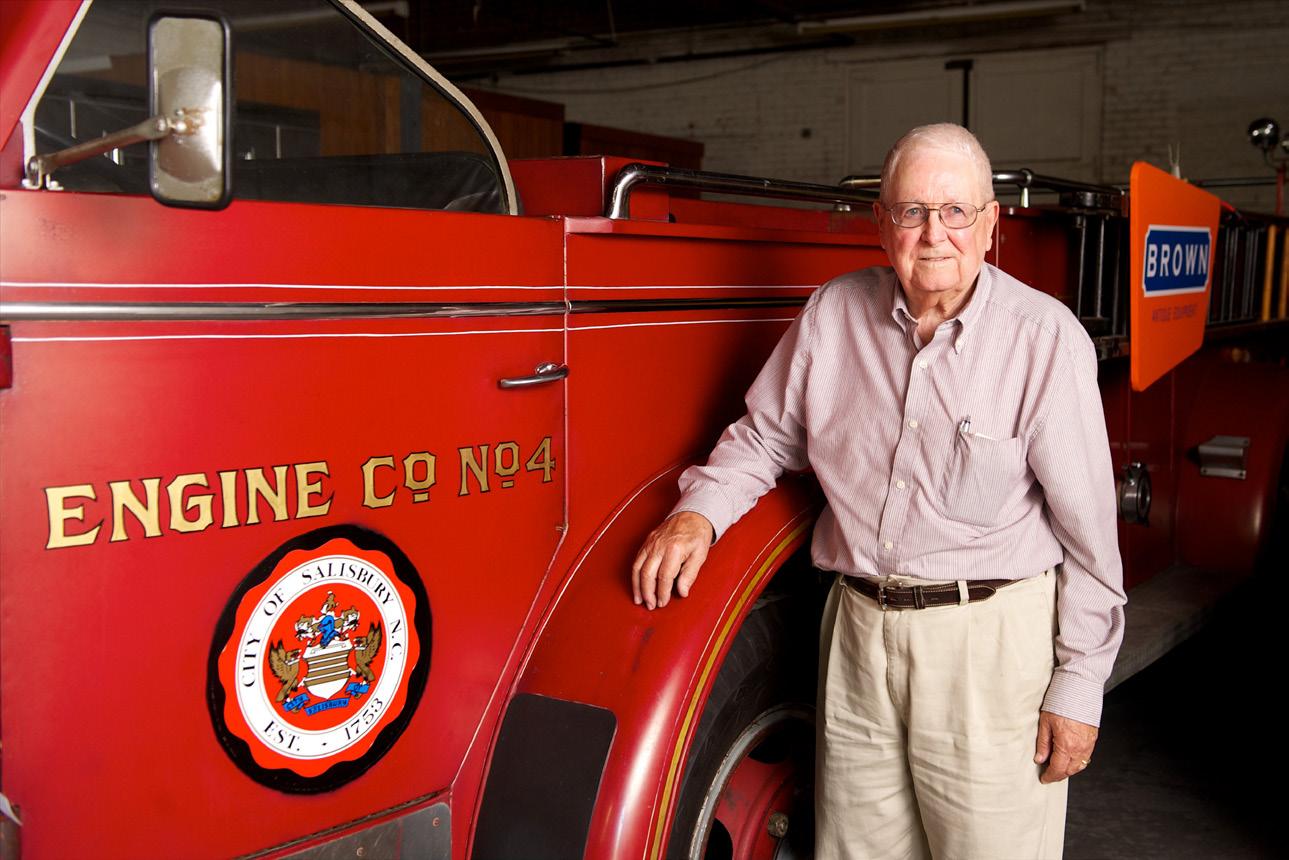
our region,” said Jeanie Moore, vice president of advancement and continuing education. “An investment in Rowan-Cabarrus Community College is an investment in your neighbors and your community.”
The initial results of the feasibility study were favorable as the community does recognize the invaluable resource the college represents in terms of educational affordability and access for local citizens. The college’s foundation is conducting further research and will consider the most critical needs of industry and individuals seeking a higher education as it finalizes it campaign strategy and focus.
“I believe that Rowan-Cabarrus Community College is a major player in the economic development of our community. Our region’s future is too important to leave to chance,” said Tony Almeida, 2011-2012 chair of the RCCC Foundation and senior advisor to the governor for jobs and the economy. “We must continue to leverage our public and private resources to ensure that our fellow citizens have opportunities for affordable, relevant higher education. A prepared workforce is essential to the economic recovery of our region.”
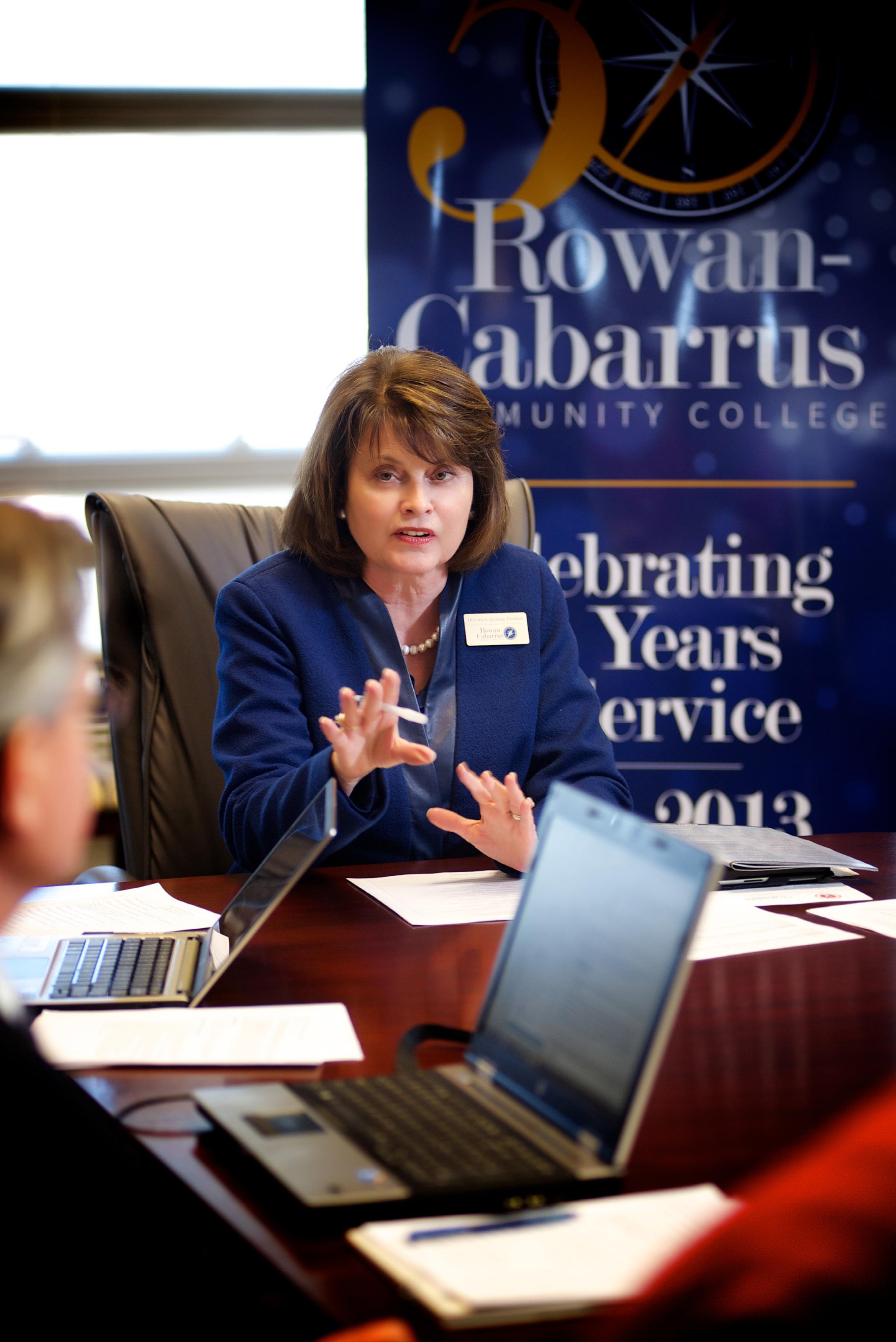
“Rowan-Cabarrus Community College is a city treasure and a critical partner in Rowan and Cabarrus counties.”
– N.C. Secretary of Cultural Resources Susan Kluttz
2012 reaffirmed the important role Rowan-Cabarrus Community College plays as a leader in our community. Visits from important dignitaries and connections with political officials reaffirmed the college’s value.
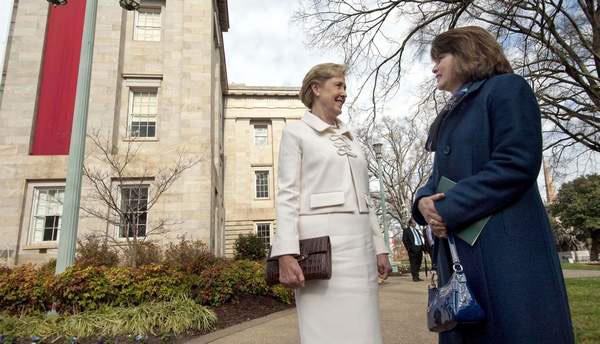
Demonstrating the college’s emerging role in the international economy, Rafael Correa, president of Ecuador, recently visited the Rowan-Cabarrus North Carolina Research Campus (NCRC) building in Kannapolis to learn more about the college’s work to train lab-ready researchers.
“It was thrilling to have the president of Ecuador visit our campus,” said President Spalding. “We are honored that he would come to see the work we’re doing here. We have a lot to both share and learn from people around the world.”
President Correa and his delegation of over 60 Ecuadorian government officials met with David H. Murdock, founder of the NCRC, toured the research campus facilities, and visited with the campus’ lead scientists.
After touring the Rowan-Cabarrus facility, members of Correa’s delegation were impressed by the idea of offering two-year biotechnology degree programs as a resource to develop a workforce for a research environment.
“In our city, we’ll have a top university with Ph.D.’s and master’s degrees, but we never thought about also having two-year degrees in biotechnology,” said Nathalie Cely Suarez,
Ecuador’s ambassador to the U.S. and part of Correa’s delegation. “That is something we learned today that we really like.”
“It’s critical to have a workforce for research facilities, and that’s what we’re providing,” said Dr. Marcy Corjay, dean of science, biotechnology, mathematics and information technologies. “We are committed to training graduates who are lab-ready – that means that our students are able to immediately work in labs and really hit the ground running.”
Correa and other Ecuadorian dignitaries also visited labs operated at NCRC by UNC-Chapel Hill, N.C. State University and Appalachian State University.

“Amazing! Outstanding!” said Correa. “A learning experience for us. We are building, in our country, a planned city of knowledge, (and) we want to learn from your experience. This (Yachay) is the biggest project in Ecuadorian history. We are (changing) from a traditional to a knowledge-based economy.”
President Correa’s visit to Rowan-Cabarrus is a prime example of the critical partnerships and linkages afforded to the college by its presence on the campus. These partnerships showcase the college’s programs and graduates and underscore the value of the college as a catalyst for economic development.
“Everything that I learned in the biotechnology program, I am doing on a daily or weekly basis. I’ve even taught co-workers how to use the hightech lab equipment. I learned how to fully operate machines like the high performance liquid chromatograph while in the Rowan-Cabarrus biotechnology program.”
– TeQuana Bayless, alumna, biotechnology program
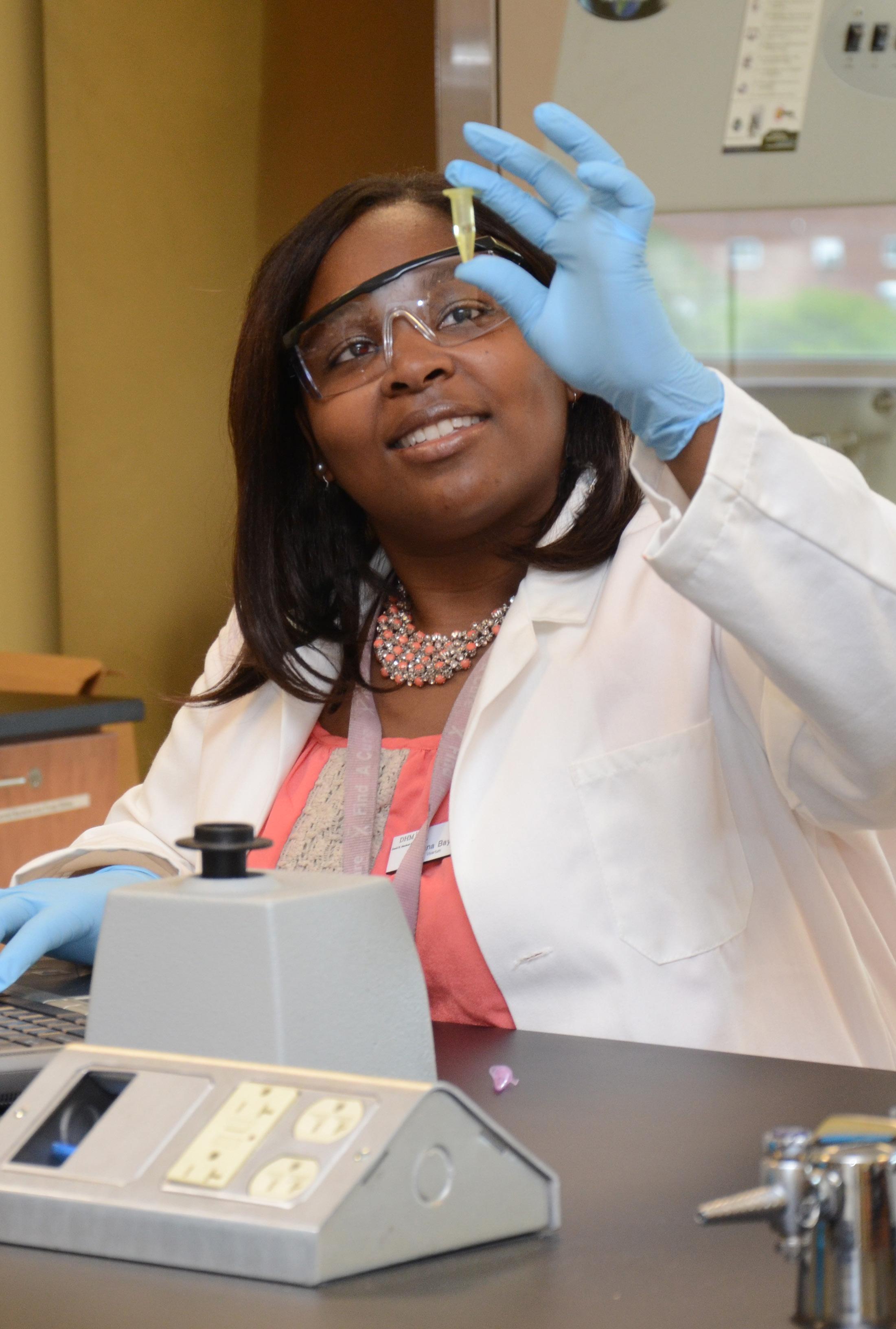
Alternative Spring Break became an option for Rowan-Cabarrus Community College students in 2012. Instead of heading to the beach, many students helped out in the community.
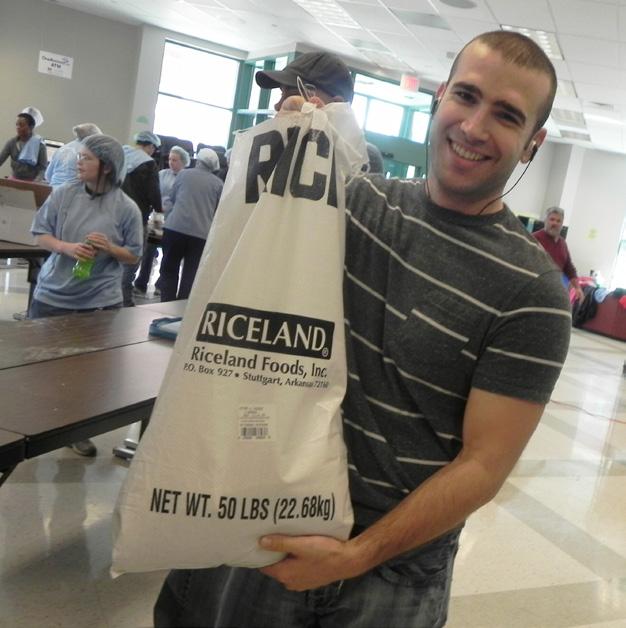
“We had a total of 130 volunteers for Alternative Spring Break,” said Kimberly Greene, 2011-12 Student Government Association president. “The energy was almost tangible! Our volunteers donated a total of 363 hours to our local communities within our service area.”
A series of community service projects were scheduled in the two-county area during the week of March 5-9, 2012. Students, faculty and staff spent time ranging from a few hours to a whole day volunteering to meet critical needs in the areas of hunger, building, repair, beautification; youth mentoring; recreation for the elderly and sustainability.
“Student life at Rowan-Cabarrus continues to flourish with record participation in clubs, activities and events,” said Gaye McConnell, vice president of enrollment and the student experience.


The college calendar is jam-packed every week with service projects, blood drives, Open Mics, legislative visits, leadership
conferences and Wii Wednesdays. It also includes student activities like the Spring Fling, Fall Fest, Holiday Hoopla and other traditional events designed to engage large numbers of students.
The roll-out of a new student publication complemented the college’s social media efforts and has improved student engagement. Student Health 101 is a monthly e-magazine for students that includes articles about health, studying, and balancing life. It also features student articles and upcoming events.
“We believe that our ever-expanding set of extra-curricular activities and communications creates a holistic student experience, developing well-rounded graduates,” said President Spalding.
“We believe that certifications and education are critical to our employees’ success, especially in the IT industry. Our education assistance program helps make continuing education possible for many of our employees. I’m thrilled that our employees are finding the training they need at Rowan-Cabarrus Community College.”
 – Dan Ballister, Time Warner Cable director of communications
– Dan Ballister, Time Warner Cable director of communications
Rowan-Cabarrus Community College has made important changes to its technology programs to ensure that students receive the best possible preparation for current and future careers.
The new Computer Technology Integration (CTI) program provides students with the ability to take several classes in different IT areas and includes over 30 industry certifications that make graduates more competitive and employment-ready.
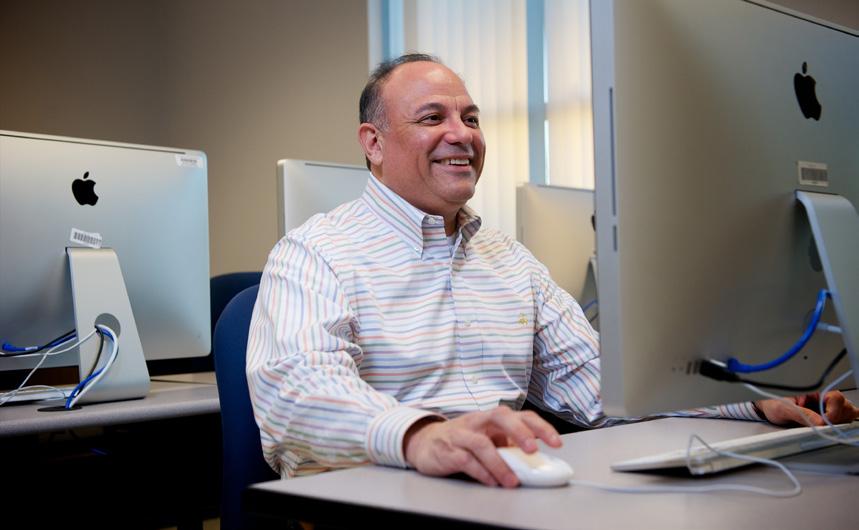

“The new Computer Technology Integration program allows our students to complete a common core of basic IT classes and then choose one of seven specialty tracks, specific to the needs of the local IT industry,” said Dr. Rod M. Townley, vice president of academic programs.
The college will now be able to quickly add new and challenging courses to the program, such as mobile phone application development, virtualization and computer crime investigation.
“Information technology is a constantly evolving field. Our training program needs to remain flexible in order to best serve our students,” said President Spalding.
Specialty tracks include:
• Cyber Crime and Digital Forensics
• Cyber Security
• (dot) .net Programming
• Emerging Technologies Programming
• Information Technology
• Networking Technology
• Web Technologies
“We’ve organized this track as a ‘stackable program’ which means each component of the program is designed to build upon itself,” said Dr. Marcy Corjay, dean of the college’s science, biotechnology, mathematics and information technology programs.
Seasoned IT professionals tend to be responsible for many components of IT and
don’t often have the time to dedicate two full years to earn a degree.
“Our course offerings appeal to the experienced IT professional and those individuals just starting their careers,” said Ian Stevens, associate dean of information technologies. “Our industry certifications allow you to access the training quickly and develop the skills necessary to continue in your profession.”
The program is designed for someone who has a passion for computers, but may lack core skills. A major emphasis of the Computer Technology Integration program is close cooperation with local industry.
“The program includes a heavy focus on cooperative education and internship experience designed to give students the real world, hands-on knowledge that will help them secure a job,” said Stevens.
Collaboration across multiple disciplines is another core component of the CTI program. For example, cybercrime and digital forensics students will be able to simultaneously take criminal justice courses toward their major.
“These certifications also have the power to open the door for interviews that a degree alone might not provide,” said John Brand, a networking instructor at Rowan-Cabarrus with over 20 years of industry experience. “The rapidly changing market demands that workers in the IT industry commit to ongoing education and certification consistent with evolving industry needs.”
The American Council on Education (ACE), creator of the GED, in collaboration with private test vendor Pearson, has announced that the current version of the test will expire at the end of 2013. This version, known as the 2002 Series GED test, will be replaced with the new 2014 GED test on January 2, 2014.
Last year, nearly 800,000 adults sat for the GED test, which is recognized by nearly all U.S. colleges and employers.

Individuals who have taken the GED test since 2002, but who may not have passed all five parts, have until the end of 2013 to complete the test successfully. Those who fail to do so will need to start over again in 2014 with the new test in order to earn their high school equivalency credential.
“The GED test opens the door to higher education and better jobs. Earning this credential gives the graduate the respect he/she deserves, and the satisfaction of this achievement coupled with the promise of continued education,” said Gary Connor, director of the college’s GED and Adult Basic Education programs. “We want to be sure that everyone is aware of this deadline. GED test-takers must act now to finish and pass before the current test expires.”
According to the GED Testing Service, more than a million Americans have started, but not completed the current test.
“Support is available right here in Rowan and Cabarrus counties,” said Connor. “We’re here to help you. We can help you prepare to take the parts of the test you still need to pass. Even with a busy schedule, you can prepare, plan and succeed at taking the GED test!”
“My first job in education was as a GED instructor, and I know first-hand how important a GED is for a person’s future,” said President Spalding. “Today’s unemployment rates are evidence that without a high school diploma or a GED, future salary is limited to near poverty levels. Rowan-Cabarrus is ready to help.”
Students work at their own pace, and the time to complete a section of the GED may take weeks or months, based upon the individual’s motivation and preparation.
The new test will be delivered solely on computer and offered only in official testing centers. Additionally, the cost of testing is expected to increase significantly from its current fee of $25.
“Our GED graduates are not just improving their individual lives; they are improving the quality of life of their families and communities,” said Paul A. Brown, trustee on the Rowan-Cabarrus Community College Board of Trustees. “If you don’t have a high school diploma, I encourage you to contact Rowan-Cabarrus today.”
Rowan-Cabarrus Community College offers free GED classes in the morning, afternoon and evening most days of the week at several locations. For more information on the GED test and preparation classes, please contact Gary Connor (704-216-3723).
Rowan-Cabarrus Community College was proud to graduate its first class of early college students at the May 2012 commencement. Of the 42 early college students graduating high school, 38 also completed their associate degree.
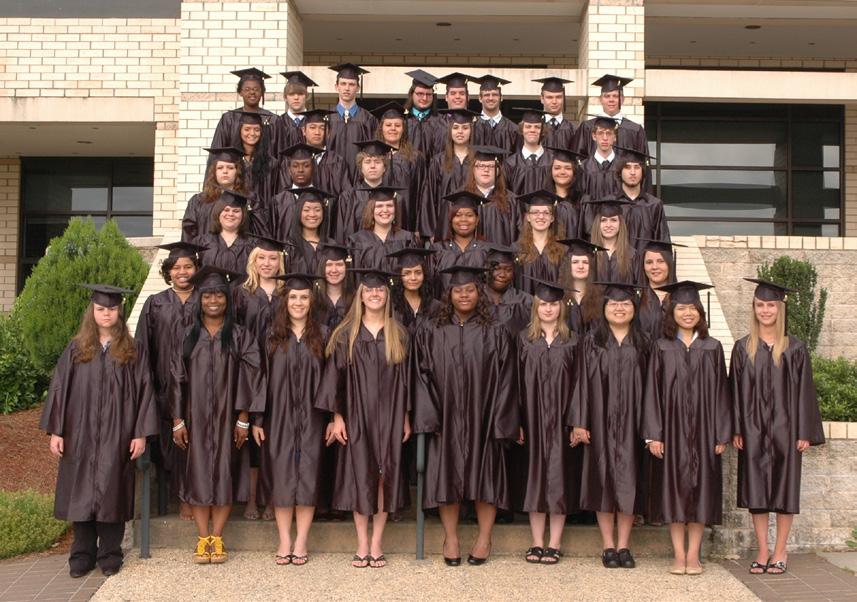
“It’s exciting because we are the first,” said 2012 graduate Yakeima White. Eighty-six percent of the school’s first graduating class are first-generation college students.
“If you are the first in your family to earn college credit or to go to college, you need to understand that you have now changed the expectations for your family. Not just for yourself, but for the generations who come after you,” said Dr. Cindy Misenheimer, principal of Rowan County Early College.
The Rowan County Early College program is based on the North Campus in Salisbury and was the first of the college’s two early college programs to have a graduating class. The Cabarrus County Early College, based at the college’s South Campus, will graduate its first class in 2013.
“The overwhelming majority of early college programs give students the opportunity to complete their high school diploma and their associate’s degree in five years. The programs that we have here are unusual, to say the least; equipping the graduates with both the high school diploma and associate degree in just four years!” said President Spalding.
“Our early college programs are a huge asset to our students, as you can tell from the results. I am confident that these graduates will go far and make our community proud.”
Graduates of the Rowan County Early College were admitted to numerous prestigious colleges, including Appalachian State University, Campbell University, Catawba College, University of Connecticut, University of Massachusetts-Amherst, UNC-Chapel Hill and many others.
“Not everyone realizes that the demographics of Rowan County Early College match up to the demographics for the Rowan-Salisbury Schools. Our school is very diverse,” said Misenheimer. “Fifty-six percent of our students receive free and reduced lunch, and several will be the first in their families to graduate from high school.”
The college’s first annual Literary & Fine Arts Festival, a celebration created by college faculty, was quite the success. With hundreds of participants and a keynote presentation at the Norvell Theater in Salisbury, the 2012 event showcased the outstanding talent and commitment of the college’s faculty.
Rowan-Cabarrus will host its second annual Literary & Fine Arts Festival to be held April 7-11, 2013.

“Many of our students at Rowan-Cabarrus are managing family responsibilities, career and the demands of their studies. Consequently, they may not have the time or means to appreciate literature and the fine arts,” said President Spalding. “The Literary & Fine Arts Festival is a special event that faculty created to make sure that our students have an opportunity to engage in activities and celebrations focusing on literature and fine arts while enrolled at the college.”
For a full schedule of events or more information, please visit http://bit.ly/ RCCCFestival
Rowan-Cabarrus Community College embarked on its second year of summer Gaming Camps to help teens imagine, plan, design and create their very own computer game.
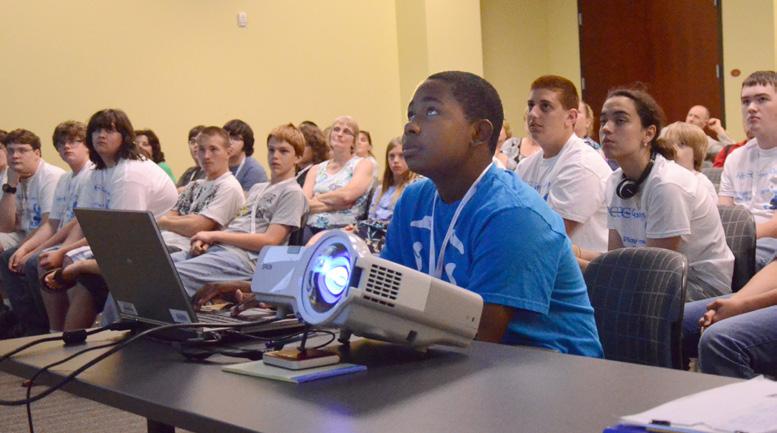
“Game development is being implemented in many different types of industries and professions. Simulation and design are already used in Fortune 500 companies for education, training and management modules,” said Dr. Scott Nason, program chair of the Rowan-Cabarrus Web Technologies program.
Building off of the success of last year’s weeklong camp, the college created two additional week-long camps in 2012.
“These budding developers often don’t even realize they’re learning important transferable skills and concepts they must eventually master to succeed in the competitive global IT workforce,” said Rob Muhlstein of IBM who assisted with the camp. “Students leave having completed a game in a week that would have taken
seasoned developers from earlier generations a year to develop.”
In today’s world, almost anyone can play a video game – whether it’s virtual bowling or dancing or karaoke – but not everyone has the skill to actually design a game.
“This program shows that education and fun really can go together,” said President Spalding. “I’m excited about the new ways Rowan-Cabarrus is reaching the community. From creating gaming camps to developing more online courses, we are trying new and different ways to improve the access and availability of quality education.”
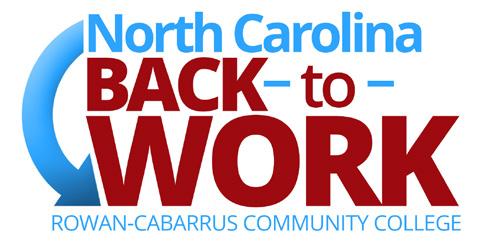
Rowan-Cabarrus Community College was recently awarded a $301,539 grant from the North Carolina Department of Commerce in support of the North Carolina Back-to-Work initiative. The program focuses on providing short-term job training and retraining to long-term unemployed citizens of North Carolina. Rowan-Cabarrus is one of 16 community colleges in the state to receive Back-to-Work funds.
Rowan-Cabarrus Community College is leveraging the Back-to-Work grant to develop and deliver training leading to stackable credentials and industry-recognized certifications, including Career Readiness and third-party technical certifications. Participants will also work with career coaches to establish a realistic career plan for entry-level employment.
The college is focusing on training based on local job availability and identified industry needs, including commercial construction, welding, robotics, OSHA, Mastercam, and Microsoft Office.
Individuals who received unemployment benefits for more than 26 weeks, or individuals who have exhausted their unemployment benefits qualify for the program, which can cover student support, career coaching, and targeted financial support, including assistance with tuition, registration fees, books and certification expenses.
“The Back-to-Work grant may assist Rowan and Cabarrus County residents who have exhausted their unemployment benefits and lack the resources to go back to school,” said Jeanie Moore, vice president of advancement and continuing education. “Our goal is to help these individuals obtain marketable credentials which we hope will lead to sustainable employment and new careers.”
Colleges were invited to apply for funding based on a prescribed set of criteria which included the number and percentage of longterm unemployed in a college’s service area, the college’s ability to carry out the program goals and the availability of potential jobs in the service area.
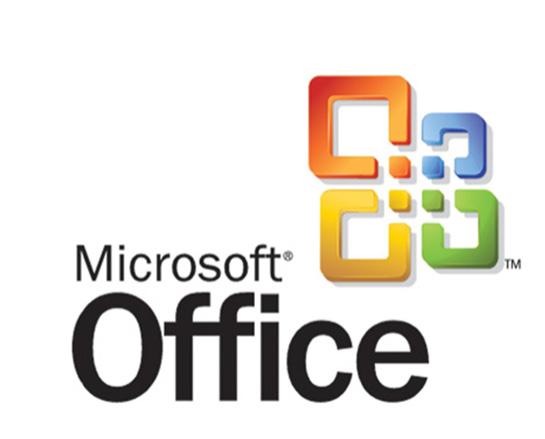
Rowan-Cabarrus Community College, as a provider of workforce development training, launched a training program to improve its own internal processes.
“Strategic organizations realize the value of continuous improvement and ongoing professional development,” said Tina Haynes, chief human resources officer. “It’s not a weakness to seek out training – it’s a strength.”
A customized in-house training program for college employees focused on the Microsoft Office Suite as the college relies on this platform for most communication and business practices.
“Many individuals in the working world –including myself – are self-taught on systems like Microsoft Office and using the Web,” said President Spalding. “We wanted to ensure that all of our employees were maximizing their use of technology in the workplace.”
“As part of the college’s customized training offerings, we train companies on everything from Six Sigma and Lean Manufacturing to Microsoft Office and Leadership Development,” continued President Spalding. “This initiative gave us an opportunity to evaluate the educational services that we provide to the community. We were thrilled to use our own Human Resource Development instructors for the actual training. I can say, without a doubt, that we were impressed with the results!”
This program and a variety of other customized trainings are available for businesses in Rowan and Cabarrus counties.
“I’m so glad the college gave me the opportunity to complete the Microsoft Office training,” said Sheila Corriher, assistant in records and registration. “It’s made a huge difference in my daily work. I didn’t know what I didn’t know, and now I know so much more.”
Rowan-Cabarrus Community College alumnus, Jeffery David Cox, Sr., was recently awarded the prestigious “2012 Yitzhak Rabin Public Service Award” from the American Federation of Government Employees (AFGE).
J. David Cox currently serves as the national president for the AFGE, AFL-CIO (American Federation of Labor and Congress of Industrial Organizations), and he has over 20 years of experience as a nurse for the Veteran’s Administration. Cox is a graduate of Rowan-Cabarrus Community College, past President of the college’s Student Government Association, and served as an ex-officio member of the college’s Board of Trustees.
Cox was selected to receive the prestigious 2012 Yizhak Rabin Public Service Award, presented by the American Friends of the Yitzhak Rabin Center (AFYRC), honoring those whose work reflects the legacy of the late Israeli Prime Minister Yitzhak Rabin.
“I’ve said it before, and I’ll say it again –our graduates go on to do great things,” said Cynthia L. Mynatt, vice chair of the Rowan-Cabarrus Community College Board of Trustees. “I am so proud of David for his outstanding commitment to our nation’s veterans and their health care.”
Cox is a nationally recognized labor leader and has been appointed by President Barack Obama to serve on the Federal Salary Council and the Federal Prevailing Wage Council. He is a native of North Carolina and now resides in Maryland.
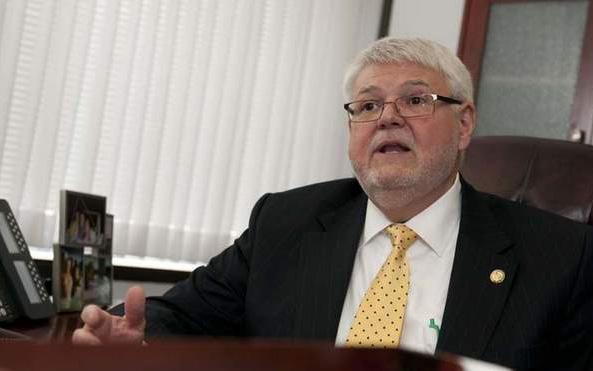

“Someone believes in me – the best way I can ‘repay’ them is to keep working hard at Rowan-Cabarrus.”
– Cheng-Hsiany Yin, student
On March 1, 2012, nearly 300 guests and scholarship recipients gathered at the Embassy Suites Resort & Conference Center in Concord to celebrate the success of Rowan-Cabarrus scholarship recipients. During the one-hour luncheon, several students shared inspiring stories about their lives and educational journeys. Scholarship recipients personally thanked their scholarship contributors during the luncheon, and many guests learned about the foundation capacity to assist students through scholarships and emergency funding.
Scholarship recipients Chase Daugherty, Sandra Johnson, and Andrew Cooper shared their personal stories, emphasizing that many Rowan-Cabarrus students are simply working to make a better life for themselves through education.
“I can’t explain how moving it was to hear from these scholarship recipients,” said Diane Honeycutt, chair of the RCCC Foundation. “These students are the reason Rowan-Cabarrus faculty and staff go to work every day and seek to continuously improve their facilities, programs and services. Rowan-Cabarrus students are truly inspiring.”
After losing her daughter last year, Sandra decided to enter the nursing field in order to give back to the profession. Andrew is working on his paramedic certification and was recently hired by Cabarrus Emergency Squad. Chase suffered from a traumatic brain
injury several years ago as a result of an auto accident. Despite his accident, he maintains a 3.8 GPA in the industrial engineering program.

“We support students from all walks of life,” said Celeste Gruner, director of the foundation. “Many of our scholarship recipients thought the word ‘scholarship’ meant funds reserved for high grade point averages. The RCCC Foundation awards scholarships based on need and the desire to achieve.”
In all, the RCCC Foundation raised $75,000 at the Annual Changing Lives Scholarship Luncheon to support new and existing scholarship and student emergency needs. Additionally, the college is eligible for $68,000 in matching funds through the Title III grant received by the college in 2011.
The RCCC Foundation has a 25 member Board of Directors, 13 committees, and over 80 volunteers. The RCCC Foundation provides funding for:
• Student Assistance (Scholarships, Emergency Funding and Books)
• Institutional Enhancement (Capital Improvements, Equipment, Program and Curriculum Support)
• Faculty/Staff Incentive Grants and Continuing Education
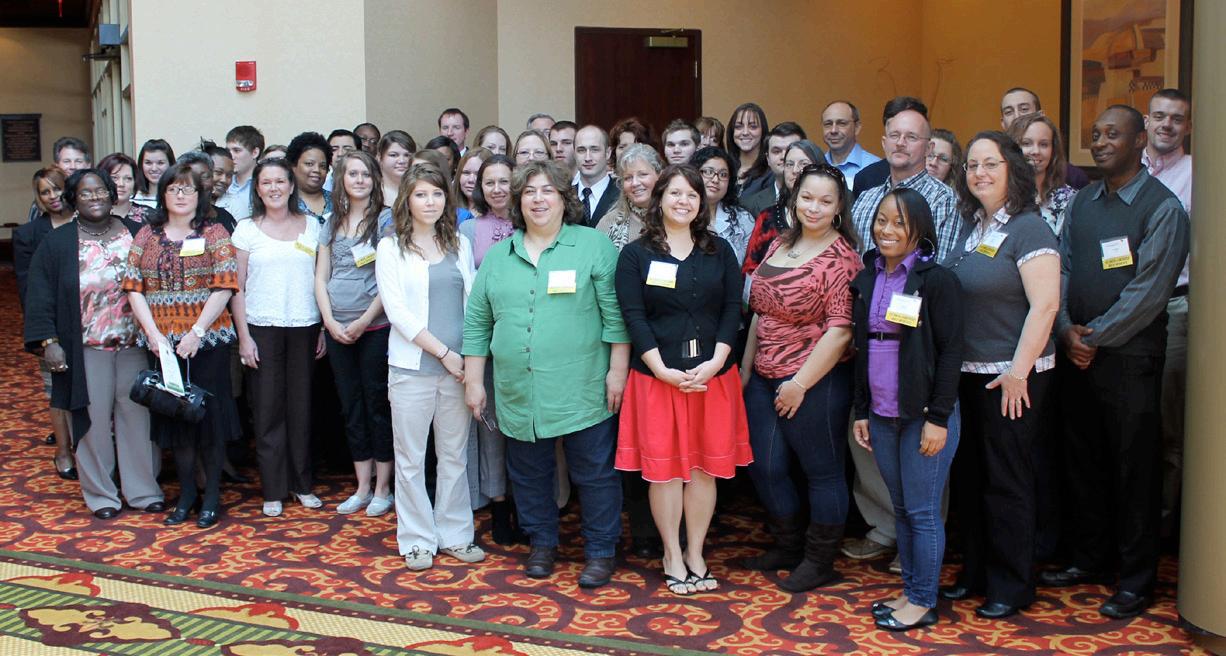
• New Program Development
For more information, please contact Foundation Director Celeste Gruner (704-216-3459).
The mission of the RCCC Foundation is to raise and manage funds, and enhance relationships that support the work of Rowan-Cabarrus Community College. Our vision is to set the standard of philanthropic support for 21st Century learning by 2015.
Thank you to the following individuals for contributing to the RCCC Foundation from January 1, 2012 to December 31, 2012.
Eddie Ables
Keri Allman
Tony and Margaret Almeida
Brenda Almeyda
William and Debbie Anderson
Dean Andrews
Greg and Cordelia Andrews
Barbara Atwell
Thomas Atwell
Colleen Balco
Lucy Baldwin
Patrick and Emily Baldwin
Rene Barger
Janice Barnes
Kim Barnett
Tom and Vicki Barnhardt
Wendy Barnhardt
Karen Baucom
Jeff and Myra Baumgardner
Carolyn Bayer
Jan Beatty
Diane Beaver
Jenny Beaver
Tripp and Carol Beaver
Jenny Bodenheimer
Amy Boger
Reg Boland
Teena Boone
J. Thomas and Rochelle Bost
Timothy Bost
Pepsi Boyer
Dustin Brilliant
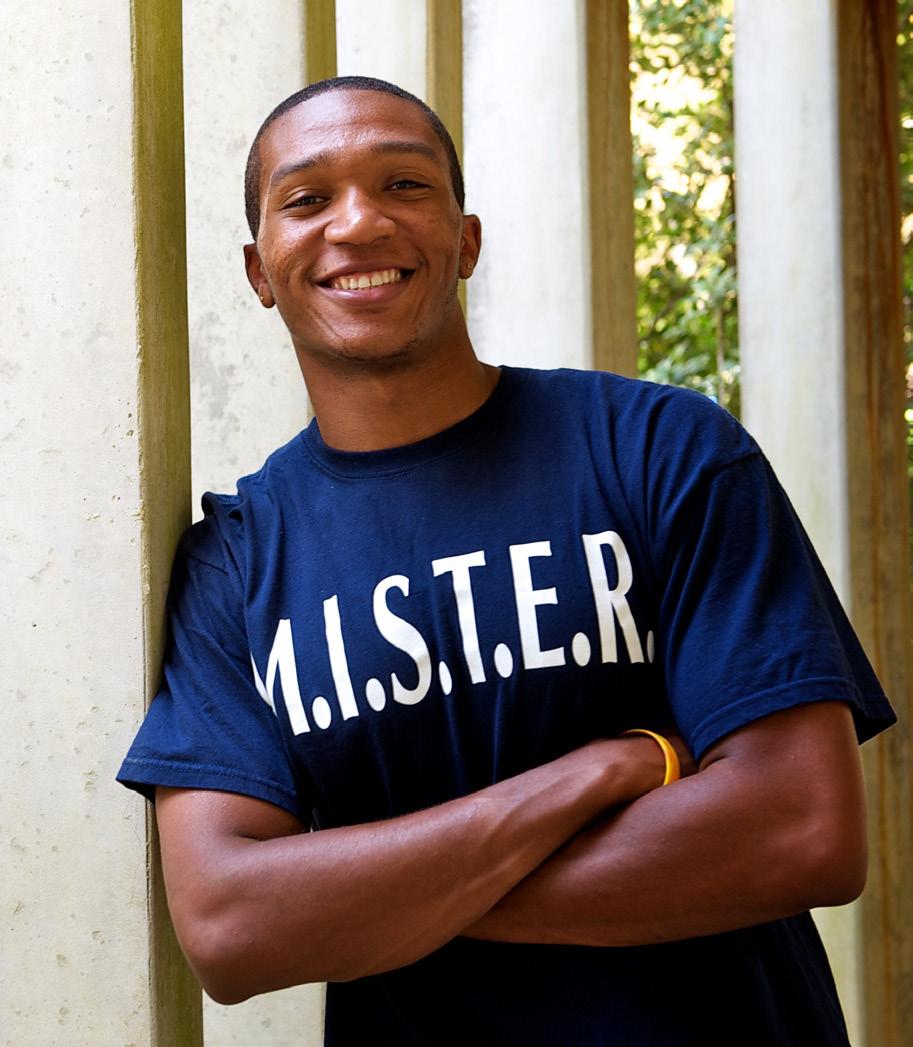
Anita Brown
Edward Brown
Paul and Melissa Brown
Ralph and Helen Brown
Hazel Burgess
David and Patricia Burke
Jeremy Campbell
Bill and Ann Cannon
Brad Cardwell
Stan and Carolyn Carpenter
Deborah Carter
Jessie Carty
Amy Caudle
Jonathan and Cameo Chamberlain
Jerry and Connie Chandler
Terry Chapman
Peter Cho
Don Chunn
Paul Clark
Ken Clifton
Lisa Cline
Chad Clodfelter
Sharon Cluka
Gary Connor
Cheryl Cooke
Linda Cooper
Richard and Marcy Corjay
Angie Corriher
Randy and Sheila Corriher
Lynn Coughenour
Martha Cranford
Holly Crawford
Joan Creeger
Daniel and Paige Crowe
Sue Cunningham
Anne Curlee
Holly Czuba
Dixie Dalton
David and Joyce Daugherty
Grace Davis
James Davis
Larry Davis
Troy and Paula Dibley
Erin DiCesare
Bonnie Dickerson
“I felt like somebody actually cared about my education when I received the foundation scholarship.”Carol Dillenger
Steve and Lina Drinkard
Gerald and Malinda Dry
Christina Dry
Vanessa Eanes
Harold Earnhardt
Mark Ebersole
Randall and Jody Edwards
Mike Efird
April Elrod
Nicole Evans
Tanya Evans
J. Steven and Robin Fisher
Luke and Diane Fisher
Lynne Fogner
Tim Foley
Yolonda Ford
Bertrand Fote
Kathy Fountain
Susan Fradkin-Ferris
Bennie and Patricia Fulcher
Hubert and Carol Furr
Richmond Gage
Lisa Garneau
Douglas Glasgow
Joseph Glass
Karen Goforth
Angela Graham
Bernie and Candy Graper
Adrian and Samantha Grass
Ricky Gray
Shirley Greene
Sherman Greer
Roger Grimm
Charlotte Grossman
Matt and Celeste Gruner
Barbara Hall
Maria Hall
Dina Harkey
Jorma Harkomen
Patsy Hartley
Shelby Harwood
Jim Hayes
Ken Hayes
Michael and Tina Haynes
Linda Heeg-Krause
Adam Helmintoller
Carolyn Helms
Daniel and Katie Herring
Heather Herrington
Syliva Hewitt
Frank Higginbotham
Michael Hodge
Veronica Hodges
Al Hoffman
Carolyn Holbert
Russell Hopkins
Sandra Horne
Pat Horton
Susan Houston
Jack Howard
Dwight and Carla Howell
William Hughes
Bob and June Hundley
Kevin and Johanna Jasper
Garrett and Susan Jenio Johnson
Kathryn Johnson
Steve and Dakeita Johnson
Kathy Joyce
Linda Kamp
Mary Jayne Kehr
Holli Kempton
Jean Kennedy
Roberta Kern
David and Katrina King
Allison Kitfield
Beverly Kluttz
John and Karen Kneip
Kathy Knight
Becky L’ Hommedieu
Rose LaCasse
Lisa Lancaster
Linda LeClair
Lisa Ledbetter
Judy Lee
Theresa Leflore
John Leonard
Ronnie and Daphne Lewis
Amelia Likin
Claude Lingle
Jackie Linker
Rodney Lippard
Tony Lippard
Natasha Lipscomb
Mayo and Betty Little
Petrea Littlejohn
Bobby and Betty Lomax
Grace Lowery
Stan and Donna Ludwig
Lori Maguire
Cheryl Marsh
Cynthia Martens
Audrey Mason
Garry and Melody Mattingly
Dora Mbuwayesango
Gene McCants
Gaye McConnell
Mary Ann McCubbins
Melody McGinnis
Brandie McHale
Terri McKnight
Barb Meidl
Elana Miles
Nancy Miles
Michael Mills
Kevin Misenheimer
Tony and Jeannie Misenheimer
Karen Mitchell
Carter and Misty Moler
Linda Mollohan
Alma Moore
Dottie Moore
Jack and Jeanie Moore
Robin Moore
Amy Moorhead
Jeannie Morgan-Campola
Ann Morris
John and Margaret Morrison
Mike and Pamela Murphy
Diana Myers
Scott and Laura Nason
Mitchell Neely
Debra Neesmith
Irvin and Sara Newberry
Edward and Susan Norvell
Louise Pack
Carol Palmer
Ray and Lois Paradowski
John and Ann Parker
Rick Parker
Tim and Ruth Parker
James and Corine Parks

Terry and Connie Paxton
Jacqueline Pearce
William Peoples
Greg Philpot
Debbie Pinkston
Kathy Piper
Christel Pittmon
Cassie Plott
Bill Plyler
Doug and Ruth Posey
Wanda Pressley-Altman
James Price
Donald and Carol Proctor
Trent and Kelly Propst
Todd and Valerie Rakes
Damon Richard
David Riley
Catherine Rivens
Dennis Rivers
John and Holly Robbins
James and Allison Robinson
Nowai Robinson
Maria Rodriguez
Melvin Rogers
Brent and Tracy Rowland
James Ruewick
Peggy Rummage
Crystal Ryerson
Dusty Saine
Robin Satterwhite
Myra Sauerbrun
Carol Scherczinger
Lydsay Schmeltzer
Denise Schweizer
Danny Scott
Patty Scott
Ron Scozzari
Jessica Seaford
Brian Seay
Brenda Sellers
Tatia Seward
Christopher Sharpe
Tony Shaw
Yvette Shelton
Barbara Sheppard
Barry and Chris Shoemaker
Lisa Shores
Carl and Luanne Short
Zeb Shue and Lou Dorton-Shue
Bethany Sinnott
Kewanna Sloan
Eddie and Jennifer Smith
Hayes and Susan Smith
Kenan and Tracy Smith
Miles and Kathy Smith
Robert and Susan Smith
Kenneth Spach
Carol Spalding and Fran Koster
Brian Spencer
Douglas and Janet Spriggs
Betty Stack
Tricia Staggers
Fred and Alice Stanback
William and Nancy Stanback
Jim and Frances Staton
Ian Stevens
Jim Stirewalt
Branoon Strickland
Sarah Surratt
Gregg and Ledley Swartz
Lara Swenson
Claudia Swicegood
William Swink
Chad Tarlton
Jay Taylor
Tori Torres
Rod Townley
Jacqueline Tucker
Lisa Tucker
Angela VandenBroek
Wade Vernon
Kathy Vestal
Perry and Judy VonCanon
Holly Wagoner
Tammara Walker
Linne Wallace
Pat and Esta Wannamaker
Jim and Kathy Waters
Brenda Weaver
Stephanie Wensil-Purvis
Sheryee West
“Becauseof my economic limitations, going to college was a dream. But, thanks to the Foundation, my dream came true!” – Carlos Peralta, Mechanical Trades Scholarship recipient
Keith and Tammy Whaley
Alma White
Debra Whiting
Nancy Whittaker
Snow Wildsmith
Patricia Williams
Joe Woodall
Paul and Beth Woodson
Belinda Wyatt
Michael and Courtney Wyatt
Ken Yelton
William Zhiviaga
Brenda Zimmerman
Thank you to the following corporations, foundations, and organizations for providing sponsorships, grants, and contributions to special projects of RowanCabarrus in 2012.
ADW Architects
Bank of North Carolina
Barnes & Noble
BB&T
Bedford St. Martin’s
Beth W. Belk, CPA
Bill Reames Insurance Agency - Nationwide
Blackwelder & Associates, Inc.
Burchfield Insurance Group, Inc.
Cabarrus Bank & Trust
Cabarrus County Commissioners
Cabarrus Eye Center
The Charles A. Cannon Charitable Trust
Carolina Farm Credit, ACA Carolina Friends of the Foreign Service
Carolina Interiors
Carolinas Medical Center - NorthEast
Castle & Cooke, LLC
Celgard
Cengage Learning, Inc.
Century 21 Town & Country
Clancy & Theys Construction Company
Cloninger Ford-Toyota-Scion
Cohen Roofing & Metal Co.
Colonial Life Insurance
Cox Marketing Group
Duke Energy
Duke Energy Foundation
ESP Associates PA
F&M Bank
Fite’s Professional Services, LLC
Food Lion Stores LLC
Forms & Supplies, Inc.
Gantt Huberman Architects
Greene Insurance Agency
Home Instead Senior Care
Ike’s Construction, Inc.
Infinity Technology Distribution & Consulting Services
Ingersoll Rand Security Technologies
Jackson National Life
Johnson Concrete
Johnson Group LLC
K. I. Interiors
KKA Architecture
Learning Environments
Lillian’s Library
MacMillan Publishing
MBAJ Architecture
Mechanical Trades Carolina
Mom Corps Professional Recruiting
Morgan Stanley Smith Barney
Moseley Architects
Normans Janitorial Service
Patterson Farm, Inc.
Pearson Higher Education Arts & Sciences
Pease Engineering & Architecture, PC
Clifford A. & Lillian C. Peeler Family Foundation
Piedmont Asphalt Paving Co. Inc.
Piedmont Natural Gas
Providence United Methodist Church Legacy Fund
R. H. Barringer Distributors
RCCC SGA
Rowan Regional Medical Center
Rowan Regional Medical Center Women’s Auxiliary
S & D Coffee
Salisbury Community Foundation
Salisbury Lions Club
Salisbury Rotary Club
Sheetz, Inc.
Shelley & Boone
Solace Salon & Spa at the Rossean House
Team Honeycutt - Allen Tate Realtors
Teksystems
Tim Schenk Electric, Inc.
Title III Grant Matching Gifts
TRD USA Inc.
Utica National Insurance Inc.
VuePoint Technology Consulting
Wayne Brothers, Inc.
Weyerhaeuser Giving Fund – U.S.
Wireless Communications
The Margaret C. Woodson Foundation, Inc.

World Fibers, Inc.
YCH Architects
the power of learning.
Major gifts of $15,000 and up are given in perpetuity as memorials or tributes to individuals, by family and friends or by corporations or associations. Endowed funds are invested with interest spent in accord with the policies of the Foundation; the principal is never spent.
Ambassadors ($250,000 +)
Ralph W. Ketner Family Endowed Scholarship
Philip Morris USA Endowed Scholarship
RCCC General Scholarship Fund
Advocates ($100,000 +)
Food Lion Endowed Scholarship
RLB Endowed Fund
Ervin W. and Miriam R. McCulloch Scholarship Fund
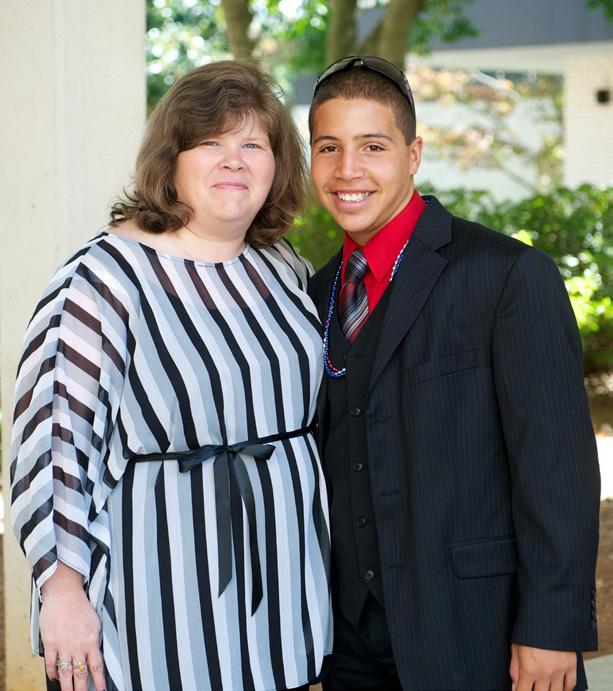
Edith Walker Estate Memorial Endowed Scholarship
Champions ($75,000 +)
Benson/Deberry Memorial Endowed Fund for Academic Excellence
Partners ($50,000 +)
AkzoNobel Corporation Endowed Scholarship
Dai Nippon Endowed Scholarship
Promoters ($25,000 +)
Dean R. and Betty I. Andrews Endowed Scholarship
Lane C. Drye Memorial Endowed Scholarship
Susan Elaine Harrison Memorial Endowed Nursing Scholarship
Clyde H. Harris Memorial Endowed Scholarship
Evelyn Kenerly Germann & Wm. Joseph Germann Memorial Endowed Scholarship
Waddell Professional Development Fund
Endorsers ($15,000 +)
Walter Almeida Endowed Scholarship
Brown Family Fire Protection Technology Endowed Scholarship
Dr. Jarrett T. Chandler Endowed Scholarship
Edna J. Chrin Memorial Scholarship
Cloninger Family Endowed Scholarship
Rachel B. Gaskey Memorial Scholarship
Clyde H. Harris Memorial Endowed
Scholarship – Salisbury Lions Club
Sam R. and Louise May Endowed Scholarship
Graham Spencer Endowed Scholarship
Ben Mynatt Memorial Scholarship
Susan J. and Robert M. Smith Endowed Scholarship
Student Emergency Endowed Fund
Other Endowed Funds
C. C. Erwin Memorial Endowed Scholarship
China Grove Civitan Memorial Endowed
Michael A. Johnson Scholarship
Concord Rotary Club Endowed Scholarship
Draft & Design Endowed Fund
Eddie Myers Memorial Fund
National Tool & Machinery Endowed Scholarship
C.T. Overton Endowed Scholarship
RCCC General Endowed Scholarship Fund
Gifts of $1,500 or more may create a Named Scholarship or Grant Fund. Contributions at this level offer the financial support needed for successful completion of certificates, diplomas, and/or degrees.
Bobbie Lois Lusk Abshire Scholarship
Art Acquisition Fund
Clancy & Theys Scholarship
Gerald Cox Family Scholarships
F & M Bank Merit Award
Anthanasius Fote Scholarship
GED Graduate Scholarship Fund for RCCC
C. Merrill Hamilton Scholarship
Al Hoffman Scholarship
Honeycutt, Horton, Brogdon & Vanderburg-Johnson Scholarship
Johnson Concrete Internship
RCCC Literary Fund
RCCC Literary & Fine Arts Festival Fund
Gernal “Buddy” Lowman Honorary Scholarship
MBAJ Architects
Mechanical Trades Carolina Scholarship
M.I.S.T.E.R. Scholarship
Dora A. Newton Nursing Scholarship
Nissan Automotive Scholarship
Lillian C. Peeler Memorial Scholarship (Salisbury Women’s Club)
Nadine Potts and Jo Franklin Excellence in Nursing Scholarship
Edward and Susan Norvell Scholarship
Continuing Education Scholarship
RCCC Foundation General Scholarship
Dr. L.H. “Pete” Robertson Jr. Radiography Scholarship
Rowan Regional Medical Center Women’s Auxiliary Scholarship
Salisbury Rotary Club Scholarship
Southgate Masonry & Lumber Co. Internship
Student Impact Grant Fund
Hilton J. Swindell Memorial Scholarship
Weyerhaeuser Giving Fund – U.S. for S.T.E.M. Scholarships
The Margaret C. Woodson Foundation Scholarships
John Wyatt Nursing Scholarship
The Margaret G. Woodson Foundation: Scholarships & Student Emergency Funds – $35,000
State Library of North Carolina, Library
Services & Technology Act Planning Grant: Development of five-year strategic plan for the college’s Learning Resource Centers (LRCs) – $20,000
State Library of North Carolina, Library Services & Technology Act Project Grant: Technology-based “Collaboratory” in NCRC LRC – $87,064
NC Tobacco Trust Fund Commission through NCCCS, Project Skill-UP:
Scholarships & career coaching –$10,000
National Science Foundation (NSF), Catawba College Noyce Scholars Program: Five-year grant for STEM to explore career in K-12 education – $64,878
(Total $329,298)
U.S. Dept. of Labor, Trade Adjustment Assistance Community College Career Training Grant: Four-year grant with Forsyth Tech leading National College Consortium for life science certifications – $18,425 (Total $49,925)
Cabarrus County Partnership for Children, Smart Start Family Literacy: Basic Skills – $55,000
NC DPI & NC New Schools Project, NC Learn & Earn Early College (Rowan): Liaison – $58,000 (Total $290,000)
NC DPI & NC New Schools Project, NC
Learn & Earn Early College (Cabarrus & Kannapolis): Liaison – $58,000 (Total $290,000)
Cannon Charitable Trust: North Campus Bldg. 400 Operational Funds – $189,048
NCCCS (North Carolina Community College System), Perkins: Federal Career & Technical Education Funding – $350,309
Rowan Arts Council, Grassroots Arts Program: Visiting artist for Literary & Fine Arts Festival – $1,500
NCCCS, NC Back-to-Work: Instruction & tuition/fees/certifications for long-term unemployed – $301,539
Weyerhaeuser Community Grant: Scholarships – $2,000
NCCCS, Minority Male Mentoring Program: M.I.S.T.E.R. – $25,694
Salisbury Community Foundation: Literary & Fine Arts Festival – $1,000
National Endowment for the Humanities, Bridging Cultures Bookshelf, Muslim
Journeys: In-kind award of books DVD films, & supplementary materials – $4,500
U.S. Dept. of Education, Title III
Strengthening Institutions Program: Academic & Career Advising Centers –$399,936 (Total $1,851,181)
Golden LEAF, Mid-Skills Training Initiative: Advanced Machining Project – $491,451
Total for 2012: $2,173,344
the power of learning.
1. Prepare students for 21st Century careers and opportunities that stimulate sustainable economic and workforce development.
Enhance current and develop new education and training programs to prepare students for existing and emerging careers.
• Obtained state approval for Health Business Informatics program and reinstated Fire Protection Technology Program.
• Integrated industry-recognized certifications into Medical Office Administration/Office Administration programs and other IT programs.
• Engaged local employers to plan for new programs and enhance existing programs, plan to introduce Occupational Therapy Assistant and Physical Therapy Assistant programs for approval.
• Developed short-term training options for long-term unemployed through $301,539 N.C. Back-to-Work.
Provide accessibility and support to meet student needs.
• Launched new wireless network covering all campuses, providing improved speed and coverage.
• Established $15,000 Continuing Education Scholarship Fund, which provided career coaching and advising to 59 students through the R3 Center.
• Implemented “My RCCC Card” for curriculum students to receive refunds faster and easier, with direct deposit or check options.
Increase completion rates by providing learning options that lead to certifications, diplomas, and degrees by participating in the American Association of Community Colleges’ (AACC) National Completion Agenda.
• Provided over 200,000 hours of in-service training for fire and emergency services personnel, resulting in 2,700 certifications.
• Graduated largest number of students in college’s 50-year history with 1,006 total curriculum graduates and 411 GED graduates in May 2012.
• Upgraded WebAdvisor to include a degree audit option showing courses completed and remaining to complete any degree at RowanCabarrus.
• Started Saturday micro-semester schedule for IT majors; adopted Computer Technology Integration (CTI) umbrella degree to enable students to earn stackable certificates throughout the degree program.
Accelerate degree completion by leveraging options (CLEP, SOC, ACE, CAEL, portfolio, work experience, internal articulation, etc.).
• Graduated first early college students: 38 students received high school diplomas and associate degrees (Rowan County).
Lead local and regional Science, Technology, Engineering & Mathematics (STEM) initiatives.
• Hosted first annual STEM Open House at RCCC@NCRC with 400-500 members of the community, including public school students, attending the April 2012 event.
• Received National Science Foundation grant to fund recruitment of STEM majors into K-12 education.
• Partnered to receive Department of Labor
grant to implement stackable bioscience credentials.
2. Produce exceptional learning that demonstrates academic excellence and student success.
Promote student success by implementing additional effective teaching methods.
• Increased use of clicker technology to gain insight to student classroom engagement and comprehension.
• Created advisory boards for the Department of Liberal Arts & General Education including professors, entertainers, authors, and artists.
• Implemented developmental math redesign of self-paced modules a year ahead of state mandate; includes new mode of distance education delivery.
Enhance superior learning outcomes by acquiring updated teaching and assessment skills through professional development.
• Increased English 111 (Expository Writing) scores with 77 percent of students successfully completing the course.
• Converted 100 percent of curriculum syllabi (1500+) to online.
• Unveiled Web Attendance for all curriculum courses, making the attendance and withdrawal processes more efficient.
• Hosted 91 sessions for Center for Teaching & Learning in 12-day Summer Institute (2011: 94 sessions in 20 days); more than 233 individuals (faculty and staff) attended during the three weeks (2011: 220 individuals over five weeks); more than 92 percent indicated that information was useful or very useful.
Complete the current Quality Enhancement Plan (QEP) by September 2011 and establish a new Quality Enhancement Plan (QEP).
• Planned the new QEP, Navigate Your Path, combining student services counseling support and academics, which provides students direction toward their academic journey at Rowan-Cabarrus and beyond.
• Received high marks and commendations on its Fifth Year Interim Report from the Southern Association of Colleges and Schools (SACS).
3. Provide excellent service delivery for current and prospective students to advance achievement.
Create an exemplary experience by developing and implementing streamlined student service processes including access, recruitment, assessment, advising, admission, financial aid, matriculation, degree completion, transfer, and transition to careers.
• Implemented online payment system for curriculum students.
• Developed execution plan for instant enrollment (online) registration for selected continuing education courses.
• Incorporated an electronic queuing service for walk-in services through the OneStop centers at both North and South Campuses; nearly 60 percent of all initial questions can be resolved on the spot.
• Opened a call center (as part of the OneStop) to field all calls; College Services
Representatives able to answer questions without transferring the call.
Provide multiple service delivery options to engage students in education, training, and career pathways.
• Increased hybrid options in continuing education programs (e.g., fire, emergency services, pharmacy technician and law enforcement).
Engage students to actively participate in planning their educational experience.
• Opened Academic and Career Advising (ACA) Centers with a goal of serving 600 students: exceeded goal by serving nearly 1,500 students.
Evaluate feedback and outcomes to refine delivery and enhance the student experience.
• Produced online publication (Student Health 101) covering topics of student interest from local level to national issues; publication reaches hundreds of students every month.
• Increased student engagement with social media from less than 400 friends on Facebook in June 2011 to more than 3,000 at the end of 2012.
4. Acquire, develop, and manage human, fiscal, and infrastructure resources essential to the development and delivery of high-quality education and service.
Plan and optimize resources in a fiscally responsible manner to reinforce public trust.
• Deployed personnel from across the college into a consolidated, front-facing customer service model, eliminating redundancy and building efficiency.
• Developed new electronic purchasing processes (E-Pro and p-cards); trained budget managers in electronic access and monitoring.
Collaborate with public and private sector leaders to secure needed levels of funding.
• Conducted feasibility study for foundation led by Eaton Cummings Group to assess local community capacity and interest for private philanthropic gifts; more than 80 private interviews conducted.
• Secured Golden LEAF grant of $491,000 to purchase equipment, software and technology for machining program.
• Secured $680,000 in additional capital improvement funding for South Campus.
• Increased donations by almost 200 percent (2010-11: $198,841; 2011-12: $590,472); more than doubled the number of donors between 2010-11 and 2011-12.
Provide facilities that are safe, welcoming, sustainable, flexible, and adequately appointed to support the College’s mission.
• Completed construction of Academic & Career Advising Center and ADA compliance renovations.
• Finalized construction plans for Rowan County bond projects, including the Fire & Emergency Services Training Facility and began designing remaining projects.
• Implemented 2011 Security Study recommendations, including training for safety coordinators.
• Awarded the “2012 Sustainable Salisbury Award” by the Salisbury Community Appearance Commission for “Outstanding Contributions Toward A More Sustainable Community.”
Become the employer of choice.
• Broadened electronic and veteran recruiting strategies to attract highly qualified employees.
• Provided multiple wellness activities (onsite mammograms and physician-led classes in partnership with Novant).
• Delivered service excellence training to 705 employees, developed “WE CARE” sub-brand with new pins and pocket cards.
• Implemented college’s classification study.
5. Serve as a catalyst for advancing the community. Build, cultivate, and maintain excellent relationships with leaders and innovators to increase support and influence practices and regulations affecting community colleges.
• Facilitated monthly strategic conversations to engage trustees in conversations with foundation directors, economic development leaders, county commissioners, public school leaders and state legislators. Topics included: community needs assessments, skills gaps, and branding.
Create and communicate the college’s brand and value through development and execution of a comprehensive marketing plan.
• Conducted college’s first market research, completing dozens of focus groups and oneon-one interviews with current students, prospective students, parents of high school students, faculty, staff, board members, and trustees; launched two sets of online surveys resulting in feedback from more than 2,000 stakeholders.
• Developed a new college logo, 50th anniversary logo, color palette, typography, tagline, website, and collateral materials.
• Expanded college use of new media (e.g., mobile advertising, Facebook and Twitter).
Generate engagement and feedback from employers for existing and new programs.
• Hosted “Lunch & Learn” event in each county to recruit area employers to assist with co-operative education placement; more than 100 employers attended these events, creating 22 new co-ops/internships opportunities for students.
Collaborate with regional economic development partners to promote job growth and entrepreneurial opportunities.
• Created 73 jobs through the advising and coaching provided through the RowanCabarrus Small Business Center.
• Named “Regional Center of Excellence” for the Charlotte area for college’s Small Business Center in November 2012.
• Hosted second annual RBI (Re-employment Bridge Institute) conference in June 2012 with Centralina Workforce Development Board with 235 attendees.
• Partnered with Rowan and Cabarrus Economic Development leaders on 10 projects, to deliver $175,127 of training to 1,443 trainees. 41
the power of learning.
46% – State Aid & State Capital Aid
37% – Noncapital Grants & Gifts
7% – County Aid & County Capital Aid
7% – Student Tuition & Fees
1% – Sales & Services, Net
<1% – Additions to Endowments
<1% – Capital Grants & Gifts
<1% – Investment Income
<1% – Other Operating Revenues
<1% – Other Non-operating Revenues
State appropriated funds support most college operations and are made up of tuition and state aid. Tuition is collected by each college and then pooled at the state level and funds a portion of the current state allocation. However, the college’s share of that appropriation is based on the previous year’s enrollment. Increases in tuition resulting from higher enrollment are generally offset by a reduction in state aid so that the total remains the same.
In Fiscal 2012, total student budget FTE was 6,856 and the curriculum tuition rate established by the state legislature increased by $10 per credit hour for both in-state and out-of-state students from the prior year. A decline in enrollment was offset by this increase in tuition rates resulting in a modest overall increase in tuition and fees of only
$9,273 (0.18 percent). The college received $27,941,103 in state aid in Fiscal 2012. State capital aid decreased by 16.28 percent from Fiscal 2011 to Fiscal 2012 due primarily to fewer state dollars available for construction and renovation expenditures.
Appropriations from Rowan and Cabarrus counties (current and capital dollars) totaled $4,595,962 representing a decrease of $382,601 from Fiscal 2011.

North Carolina community colleges operate on a cash basis accounting system with fiscal year end at June 30. Revenues may exceed expenditures when monies received for grants, financial aid awards and other institutionally funded activities are received before June 30, but expenditures are recorded after the end of the fiscal year.
36% – Instruction
27% – Student Financial Aid
15% – Institutional Support

10% – Academic Support
5% – Student Services
3% – Operations & Maintenance of Plant
2% – Interest Expense
2% – Depreciation
<1% – Auxiliary Enterprises
<1% – Other Operating Revenues
Total Expenditures $66,554,932.84
J. Thomas Bost
Paul A. Brown
Darise D. Caldwell
R. Daryl Cox
Dianne Y. Greene
Susan W. Kluttz
Robert S. Misenheimer
Cynthia L. Mynatt, Vice Chair
Irvin T. Newberry
Diane Honeycutt, Chair
Brian Miller, Treasurer
J. Scott Padgett
Carl M. Short, Jr., Chair
Carol S. Spalding, Ed.D., President and Secretary to the Board
Dakeita Vanderburg-Johnson
Quentin Woodward, Jr.
James Hopkins, Student Government Association President
Starling Johnson
Katrina King
Carol S. Spalding, Ed.D., Secretary
Cordelia Andrews
Raegan Brogdon
Paul A. Brown
William R. Burgin
William C. Cannon, Jr.
Marcus Childs
Dianne Y. Greene
Carol M. Herndon
Pat Horton
Melissa Meacham
Cynthia L. Mynatt
Irvin Newberry
Mary Ponds
Lisa Tucker
Dakeita Vanderburg-Johnson
Bill Wagoner
Kathy Waters
Paul Woodson
Dennis E. Yates
Jeremy P. Campbell, B.A. Chief Information Officer
Jonathan S. Chamberlain, B.B.C. Chief Officer of Planning, Capital Projects & Environmental Operations
Tina M. Haynes, M.S. Chief Human Resources Officer
Carla G. Howell, A.A.S. Chief Governance Officer
Gaye N. McConnell, M.A. Vice President of Enrollment and Student Experience
Jeanie H. Moore, M.A. Vice President of Advancement and Continuing Education
Janet N. Spriggs, M.S. Chief Financial Officer
Rod M. Townley, Ph.D. Vice President of Academic Programs
Rowan-Cabarrus Community College improves lives and builds community through public higher education and workforce development.
Vision:
Building sustainable futures through the power of learning.
Values:
• Trust, integrity, inclusiveness and mutual respect
• Excellence and innovation for 21st century education and workforce training
• Exemplary service-delivery experience
• Continuous improvement through lifelong learning and achievement
• Responsibility, sustainability and accountability
• Relationships, teamwork, and global citizenship
• April 26, 2013 – Vintage Prom
Salisbury Train Depot
• May 16, 2013 – Legislative Family Day
Raleigh, North Carolina
• September 3, 2013 – Founders’ Day Celebration (Hail & Farewell)
Country Club of Salisbury
• September 30, 2013 – Fire & Emergency Services Training Dedication
North Campus, Salisbury
• October 16, 2013 – Employee Appreciation Day
North Campus, Salisbury
• March 16, 2013 – Tour de Campus Alumni 5K
North Campus, Salisbury
• April 7-11, 2013 – Literary & Fine Arts Festival
North Campus, South Campus, NCRC
• April 12, 2013 – STEM (Science, Technology, Engineering, and Mathematics)
Open House
RCCC @NCRC, Kannapolis
• April 20, 2013 – SGA Spring Fling (Birthday Party)
North Campus, Salisbury
• May 11, 2013 – Graduation
Cabarrus Arena & Event Center, Concord
• July 31, 2013 – Commemoration of 10th Anniversary of Pillowtex Closing

A.L. Brown High School Auditorium, Kannapolis
• August 23, 2013 – Rowan-Cabarrus Night at the Intimidators
CMC-NorthEast Stadium, Kannapolis
• September 21, 2013 – Tour de Campus Alumni 5K
South Campus, Concord
• October 14, 2013 – Foundation Annual Golf Tournament
Club at Irish Creek, Kannapolis